#Roman has a lot of unpleasant qualities
Text
𝐂𝐇𝐀𝐑𝐀𝐂𝐓𝐄𝐑 𝐅𝐋𝐀𝐖𝐒.
𝗕𝗢𝗟𝗗 — character trait.
𝘐𝘛𝘈𝘓𝘐𝘊 — situational.

absent-minded | abusive | addict | adrenaline junkie | aggressive | aimless | alcoholic | anxious | arrogant | audacious | bad liar | bigmouth | bigot | blindly loyal | blunt | callous | childish | chronic heroism | cheater | clingy | clumsy | cocky | codependent | competitive | corrupt | cowardly | cruel | cynical | delinquent | delusional | dependent | depressed | deranged | disloyal | ditzy | egotistical | envious | erratic | fickle | finicky | fixated | flaky | frail | fraudulent | foul mouthed | guilt complex | gloomy | gluttonous | gossiper | gruff | grudgeholding | gullible | hedonistic | humorless | hypochondriac | hypocritical | idealist | idiotic | ignorant | immature | impatient | incompetent | indecisive | insecure | insensitive | lazy | lewd | liar | lustful | manipulative | masochistic | meddlesome | melodramatic | money-loving | moody | naive | nervous | nosy | ornery | overprotective | overly sensitive | paranoid | passive-aggressive | perfectionist | pessimist | petty | power-hungry | proud | possessive | pushover | reckless | reclusive | remorseless | rigorous | sadistic | sarcastic | senile | selfish | self-destructive | shallow | sociopathic | sore loser | spineless | spiteful | spoiled | stubborn | suspicious | tactless | temperamental | timid | thief | tone-deaf | traitorous | unathletic | ungracious | unlucky | unsophisticated | untrustworthy | vain | withdrawn | workaholic
𝐓𝐀𝐆𝐆𝐄𝐃 𝐁𝐘. @arkhampsych (Thank you Ciar! ♡)
𝐓𝐀𝐆𝐆𝐈𝐍𝐆. @alicesought, @batmanwholxughs, @brutalscaled, @defectivexfragmented, @desmuerte, @king-crane, @luposcainus, @shinebrightsweetdove, @splinterdsoul, @thewomanwholaughs and anybody who wants to do this?
#( 💀 ♮ DASHBOARD DECEPTION ♮ | memes )#( 💀 ♮ UNMASKED MALICE ♮ | headcanons )#This was fun to do thank you Ciar!#I don't think I've done this one before#Roman has a lot of unpleasant qualities#He's definitely a vain bastard#Not in physical features but in appearance#Always wanting to wear good suits and luxury wear#That kind of vain#He can be shallow too asdfghjkl
12 notes
·
View notes
Note
For the made up fic title: Reverse
Cannon AU, Platonic DLAMR + P, ThomasNico
Okay so, AU where Remus is the dominant side of Creativity instead of Roman. Thomas still ended up being an ~online personality~ but his shows are much ‘edgier’, not family friendly and rely a lot on horror, sex jokes and shock humour. He gets criticised for running the same joke into the ground, taking things too far and for having made a load of vines featuring ‘mean’ pranks back in the day. Nevertheless, he still has a cult following with his fans insisting that a lot of his horror stories are really innovative, that he’s actually a very sweet and that he deserves props for having built up an inclusive little community of weirdos. its kind’ve a ‘we’re all freaks here so everyone’s welcome’ vibe.
Remus is still prone to disturbingly violent thoughts, but its less common and easier for Thomas and co to manage since he’s always expressing/working through them safely through his videos. Unlike cannon!Roman he’s not at all bothered about being original or what his audience thinks of him - he just hits Thomas with whatever idea occurs to him, no refining needed. Sometimes genius, sometimes really, really not - fan opinion is divided on whether the inconsistency makes Thomas’ work spicy and exciting or just a mess
Since Roman doesn't have a seat at the table and Remus is more ‘immediate gratification’ guy, this version of Thomas doesn't really have ~Dreams~. He very much living in the moment
To counterpoint that, Logan is even more obsessed with routine and structure than he is in cannon. He (and Janus) are basically driving whatever's left of Thomas’ ambition so he’s the one pushing editing schedules, video quality assurance, trying not to let them get demonetised etc etc Him and Remus argue a lot (similar to how him and Roman do in cannon) and sometimes that can get a bit violent and unpleasant (he can’t fully just ignore Remus in this universe since Ree is a more core part of Thomas) and since Remus doesn't take anything seriously he always moves on quickly whereas Logan is left to sulk
Janus would probably have been introduced to Thomas a lot earlier and has a similar level of influence to Patton (if not more). Janus is the one who rationalises away and doubts about the ~problematic~ nature of some videos as people not understanding their ~vision~. He’s also in charge of preventing Thomas from just blurting out any Remus inspired thought to random people which is e x h a u s t i n g
Patton is more inclined towards his inner child ‘eat an entire plate of candy for dinner’ thoughts than his team dad ‘you need to learn to cook and take care of yourself for the future’ thoughts. Since he has less influence on Thomas than he does in cannon ,Thomas is a much less trusting person and doesn’t have many friends, but the ones he does have Patton is fiercely loyal to.
Virgil is most similar to his cannon version, just a bit spikier. (We know Thomas dealt with cannon Virgil when he was a teenager by having Roman come up with fantasy stories to distract him, in this version it was horror and gore filled stories and Vigil developed a darker presence as a result)
ANYWAY that’s all set up - the plot kicks off when Thomas meets Nico. Thomas doesn’t really do romance or relationships, just casual hook ups and such. So he sees the cute boy, easily heads over to flirt (no anxiety cus there’s no real stakes), Remus gives his a list of extremely explicit pick up lines, Janus wrestles that down saying hey and then.
They get chatting
and THEN.
butterflies in his stomach. And Nico’s not just cute he’s smart and interesting and funny and maybe this could be more then a casual hookup and what the heck he never thinks like this and WHY IS THERE A NEW SIDE DRESSED UP LIKE A DISNEY PRINCE SQUEEING AT HIM ABOUT WHAT FLOWERS HE SHOULD BUY??
So Thomas meets Roman, and suddenly he’s got a head full of fanciful, dreamy romantic thoughts totally distracting him from the sexy zombie sketch he was meant to be writing (which Roman thinks is totally gross anyway)
The others, to put it lightly, are concerned.
Logan and Janus are stressing out about Thomas' career - Roman’s got some ideas which are very much NOT on brand and could end up loosing them followers and therefore income and god he’s almost as loud as Remus but with MORE singing
Remus is NOT happy about suddenly having a big rival for Thomas' attention
Virgil hasn’t had to deal with anxiety relating to romance, what other people think of them, how much people like his ideas ANY OF THIS SHIT THAT THAT PRINCY GUY IS BRINGING for YEARS he is FREAKING OUT
Patton....Patton is pretty happy to see him actually
CHAOS. Shenanigans. Rivalries. Eventual coming together to help Thomas Get His Man. reconciliation. Roman finally getting attention for this first time in a long long time. Family feels. etc.
#sanders sides#roman sanders#remus sanders#logan sanders#virgil sanders#fake fic meme#which should have been done#ooooh#so long ago XD#they strike at any time#it was fun thinking about how Thomas might have been different if the sides influence ratios shifted#sidespart writes#m4delin
220 notes
·
View notes
Text
Venus in the 12th House: Why It’s Time to Find Pleasure in Solitude
If you follow astrologers on social media, you've probably noticed that we tend to make a big deal of it when a planet changes signs.
There are two reasons for this:
1. We are all scrambling to create content, and we are all using the same three astrology planners to help us do it. Planetary ingresses (which is the technical term for when a planet changes signs) are highlighted, so they catch our attention and are relatively easy to write about.
2. The Romans used to say that the way a thing begins often says a lot about the nature of the thing. By observing the first day of a planet's passage through a sign, you can often determine the nature of the business the planet has with you during its passage through that sign.
Usually, planetary ingress days don’t feel very important to me. Suitably for someone born under the sign of the bull, I have a thick skull when it comes to planetary energies. It takes a lot of drama to get through to me.
The day Venus moved into the 12th house was one of those high-drama days. I felt like I was made of glass. Every social interaction felt like it left a chip or a crack. Issues with my social circle that I had been coping with adequately for months boiled over all at once.
Venus is supposed to be a benefic planet, so it was surprising to experience a Venus transit that way.
One of the qualities of the benefics, however, is that they try to improve whatever they touch.
Venus in the House of Troubles
The 12th house is about withdrawing from the world to attend to yourself spiritually. Monastics and mystics tend to have strong 12th houses, but so do addicts and people who struggle with chronic health problems.
Even if you read the 12th house as positively as you can, it's a difficult area of life to work with. Doing it right requires the self-discipline to spend a lot of time alone and a willingness to look in the mirror without flinching.
I have a difficult relationship with the 12th house. I just finished my 12th house profection year, which is supposed to be a time when you let go of the old self and prepare to become something new. I resisted it with every fiber of my being from the first day to the last. It just didn't feel like the right time to step away from the world for a year.
In retrospect, I can see, while I consciously worked very hard to resist withdrawing from the world, life conspired to bring about endings. I withdrew from online communities that I had been very invested in. The worldwide pandemic kept me from IRL gatherings that would have usually taken a lot of my time.
Despite these realizations, I know I haven't even begun to make peace with the 12th house. I still fundamentally see it as something to be fought.
Venus Full of Grace
Just before I wrote this, I did something I almost never do: I shut my office door.
Then I lit a stick of my favorite incense and went back to work.
It's just me and my roommate home right now. We're on separate floors, and he's great about respecting my work, but the meaning of a shut door feels important to me right now. I need to create a safe and beautiful haven of solitude.
Pleasure in solitude: That's a Venus sentence if I've ever heard one.
It's almost like Venus is taking me by the hand and saying, "This year has been hard. You've been forced into a lot of solitude you don't want, but your happiness depends on not associating every moment of solitude with this unpleasantness."
Venus is spending most of this month in Cancer, and we're all being invited in various ways to heal our hearts from the imposed solitude of the last year.
What healing pleasures are you embracing right now?
52 notes
·
View notes
Text
Rider of Clouds
A a loose adaptation of the Ugaritic Baal cycle of myths, with some changes and the holes patched up with other myths and historical trivia. It will probably go on and on as some sort of silly “myth crossover” thing.
Mount Saphon, the spiritual center of a large but poorly defined area spanning from the Mediterranean Sea to the Euphrates and the residence of many gods, needs a new king. While the former king of the gods, El, favors his distant relative Yam, this decision is not popular with the other deities and would be a disaster for their human followers; however, few dare to question El decisions in public. The exception is Baal, the heir(ess) of El's popular but not very ambitious rival Dagan, determined to take Mount Saphon to the bright future of the late bronze age.
Protagonists

Baal (Hebat) – the eponymous Rider of Clouds (a real title used in myths and cult texts), a young weather deity born to Dagan and Shalash (not pictured), semi-retired agricultural gods who settled in Tuttul on the Euphrates shortly before Baal's birth. Dagan hails from Mesopotamia proper, while Shalash is Hurrian.
While the mythical Baal Hadad is male, my version is a woman – the idea started as a joke about conflating Baal from the Baal cycle with Baalat Gebal, a female figure associated with another levantine bronze age city (BG's actual identity is an object of much scholarly debate) being more valid than conflating him with much later Baal Hammon from Carthage (or rather with Roman hot takes about this deity), which happens a lot online, but I got attached to it o now here we are.
She nonetheless uses a male title inherited from her father, much like a few historical female rulers did. In my version “Hadad” is only a title (or rather a me, eg. divine attribute), and her real name is actually Hebat. Irl Hebat was, among other things, the name of a goddess mentioned in one inscription as Dagan's daughter, and thus a featureles sister of Baal. As the levantine/syrian Hebat lacks a defined character in real mythology (”another” Hebat was regarded as the Hurrian storm god's wife but was at times replaced in this role by the more interesting sun goddess of Arinna and that's about it; I'm not going to use that one in my story) it should be fine to conflate her with Dagan's best attested divine child, I think?
Baal is impulsive and follows a moral code which, depending on the point of view, might be either naive or heroic, which means she's not exactly the optimal person to get involved in n-dimensional divine politics (the ideal person to be the protagonist of an Ugaritic epic poem, as evidenced by history), but that's not enough to stop her from trying; the popularity with humans helps, too. The story documents her rise to the position of the head god of the pantheon residing on Mount Saphon, ruling over Ugarit and other surrounding areas.
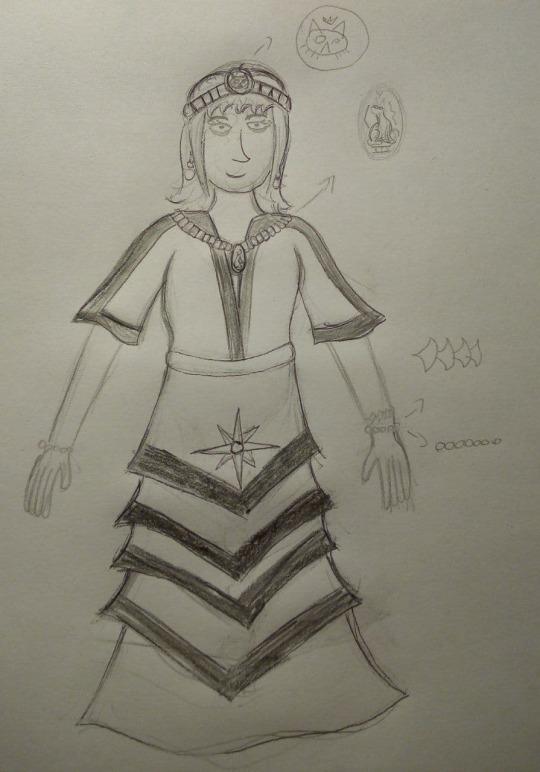
Astarte (it should be Ashtart for maximal accuracy but everyone knows the later form of the name better so...) – a goddess of humble origin and no particularly well defined attributes, who attaches herself to Baal initially in hopes of advancing own career, though the two eventually develop a more genuine relationship. She patterns herself after the much more famous Mesopotamian Inanna, seeing her as an ideal to strive for.
While Baal has the name recognition and disposition fitting for a major deity, Astarte is the part of the duo actually capable of navigating politics, and takes the title of Face of Baal, negotiating support for Baal's bid with other gods. The image of Baal she projects differs slightly from reality, though not enough for most onlookers to notice.
Astarte is also a connoisseur of foreign clothing (as pictured above) and art.
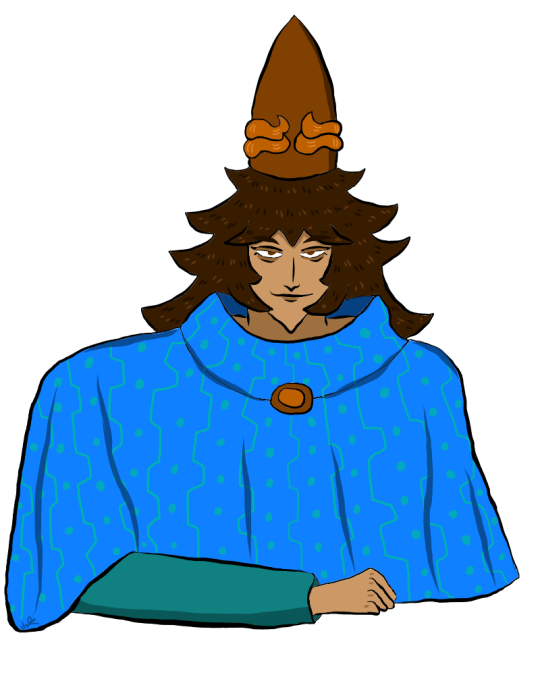
Anat (art courtesy of my girlfriend who sadly isn’t on tumblr but who helped a lot with figuring out a lot about this story) – the younger daughter of the ruling couple of Mount Saphon. Her philosophy differs greatly from her parents' and as a result she isn't really seriously considered for succession. Her hobbies include bladed weapons, gambling and heroic epics; in the past she attempted writing her own self insert one. Her temperament means she was never considered for succession, which she doesn't particularly mind.
She's deeply invested in Baal's ascendance, and is probably the god Astarte wants to recruit for their cause the most.
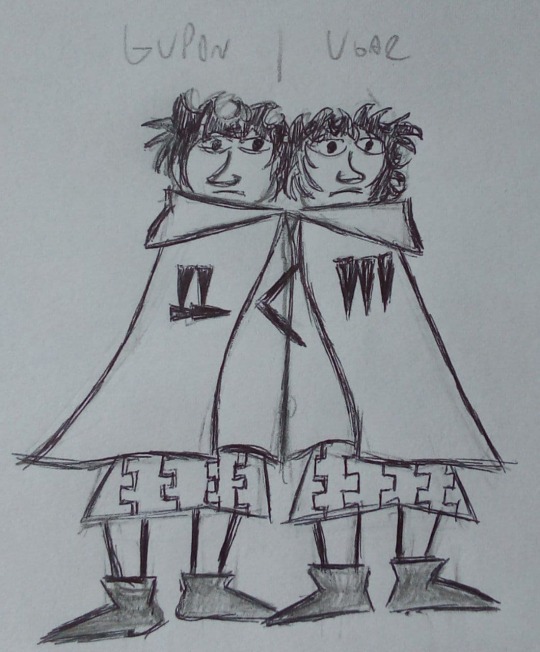
Gupan and Ugar – two minor gods who might be some of the only allies Baal recruited herself rather than with Astarte's help. They play a minor role in the story as her messengers and heralds (just like in the real myth!). They're also a couple. The cuneiform on their coats says “Baal.”
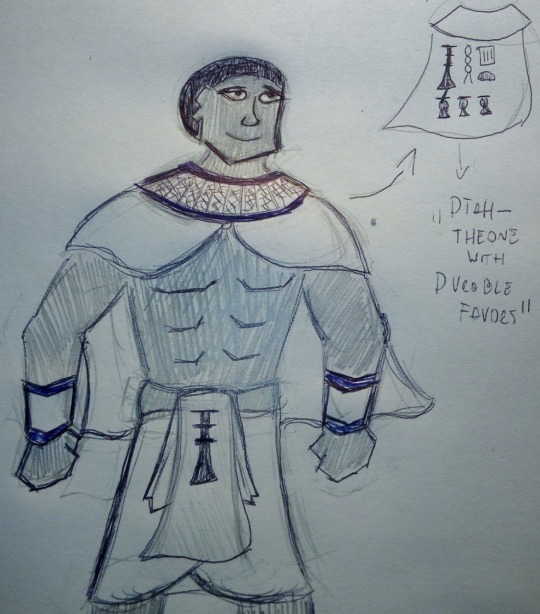
Kothar-wa-Khasis – a craftsman god who, by own admission, only works part time in Ugarit and travels the world for the rest of it. He's kind and dependable and his wares are both affordable and of great quality, but his real motives are hard to ascertain. His real identity is likewise a subject of much speculation among other gods – while his preferred manner of clothing hints at an egyptian origin, nothing is known for sure.
His true name is that of the god Ptah of Memphis; he spends most time outside it and incognito because he thinks smaller pantheons on the periphery of Egypt's influence offer more artistic freedom. He speaks in a very poetic pointlessly complex way (basically... imitating the style of ancient poem translations). While an architect first and foremost he a reneissance man - architect, sculptor, engineer, armorer, musician. He isn't very fond of Yam due to the latter's lack of aptitude for art and cost cutting suggestions.

There are actually two gods hiding behind the title “Kothar-wa-Khasis,” with the second one hailing from Caphtor (Crete) from where Kothar arrives when commissioned to build Baal's palace in the real myth. She's shy and refuses to reveal her real name and hides behind the title “Mistress of the Labyrinth” and the labrys symbol. Her arrival is generally a sign of the duo taking a project particularly seriously.
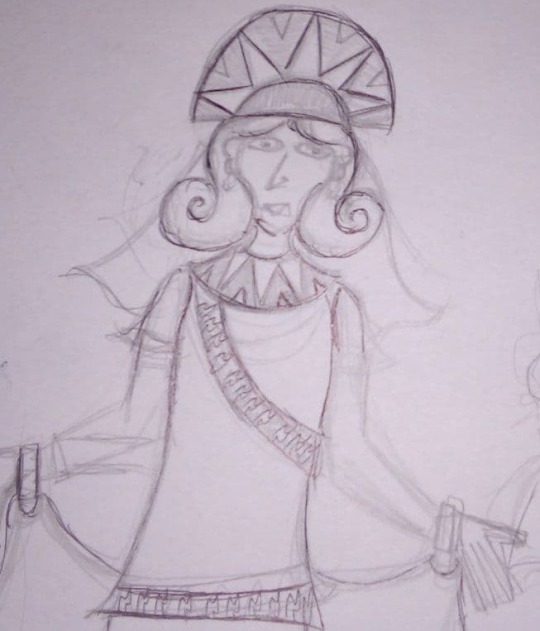
Shapash – El's firstborn daughter, serving as “the torch of the gods”, a royal herald and solar deity. She also handles her parents' “foreign policy” on their behalf, which in practice means figuring out how to placate neighbors whose decisions aren't guided by the need to avoid angering various reviled figures.
Antagonists
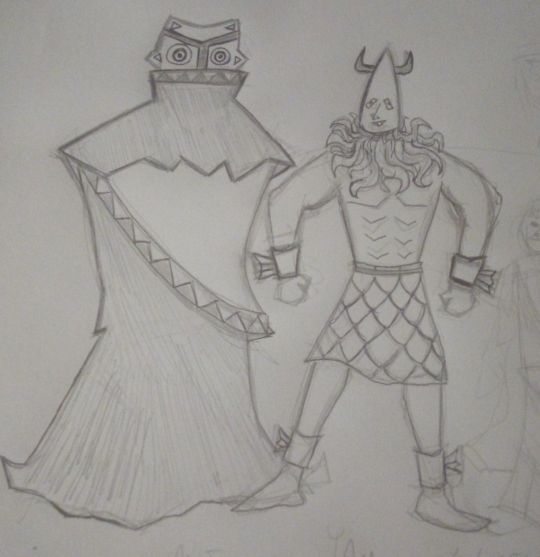
Yam (right) – a sea monster more than a god, presiding over the nearby section of the sea and all that dwells in it, including the commercially significant sea slugs. He's also the son of the formerly influential Anatolian god Kumarbi, banished to the underworld by the current head god Teshub due to his many past misdeeds. As a result of his father's past influence over the world (and current influence over the ruling couple), Yam gained El's support and received many titles, which de facto makes him the most likely to succeed El as the king of local pantheon. He's capricious and inconsiderate, but maintains a larger than life public image meant to make him palatable to potential backers.
The exact circumstances of his arrival in Ugarit are shrouded in mystery, and may or may not be responsible for his unusually strong hatred of Baal.
Mot (left) – profoundly unpleasant and unsociable being kept around by Anat's parents for unclear reasons. He resides in the great offering pit in the abandoned city of Urkesh, formerly the center of Kumarbi's sphere of influence, reduced to a ghost town.
While his equivalents in neighboring areas generally view themselves as impartial or as a necessary evil, Mot gets his kicks from posing as a personification of death itself, and is notoriously corrupt.
El and Athirat – the ruling couple of Mount Saphon and parents of Anat and Shapash, currently pondering retirement, which stirs many contenders to the throne into action. El is a lifelong opportunist changing views and allegiances as he sees fit, though he pretty consistently favors his distant relative Yam as his main underling ever since the latter arrived in the area.

El was originally Amurru, a courtier of the sky god Anu, overthrown by the nefarious Kumarbi. For unclear reasons Kumarbi made Amurru his vassal and bestowed the name Elkunirsa, or El for short, upon him.

Athirat is largely responsible for El maintaining his title for so long, and is a much craftier politician than he is. She comes from an influential dynasty of sea gods, but lacks dominion over the sea herself.

She and Yam are related, as seen here.
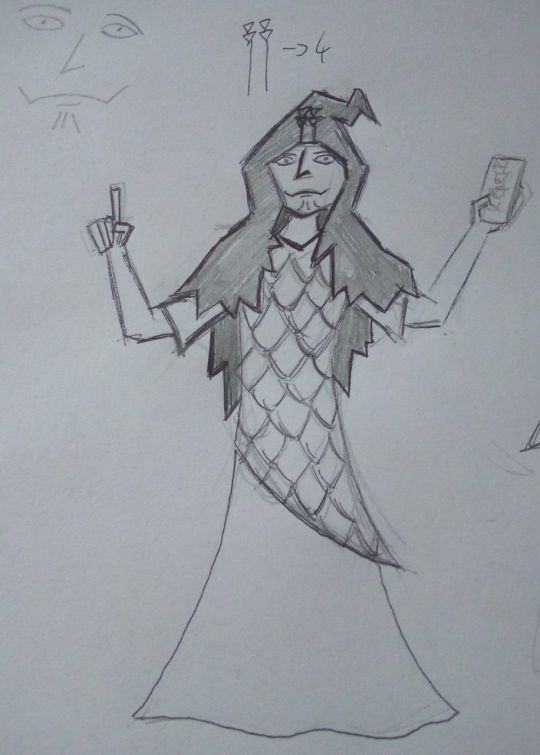
Abduyam – an attempt at developing an obscure figure from the original myth, Yam's nameless and seemingly rather rude and infuriating messenger, into a full blown character. The theophoric name he uses (there are real theophoric names invoking Yam, surprisingly) is just a pseudonym, and his real identity is a mystery. He interned under a variety of famous mythical villains in order to gain a greater understanding of their ways, and currently serves as Yam's messenger, adviser, doorkeeper and punching bag.

Ashtar – a feeble opportunist who sides with Yam, hoping to receive a share in the gains he's making thanks to El's blessings. He's pretty content with playing the role of a toady though his aspirations might be different, as Baal and Astarte suspect due to his love of gaudy imported textiles. Megalomania doesn't necessarily equal malevolence, though.
He also loves sea slugs.
Foreign dignitaries

(ignore the ?, it’s just Baal)
Marduk (right) – the tutelary deity of Babylon, a prominent and internationally renowned god. While technically the area encompassing Mount Saphon, where the events of the story take place, isn't directly under the control of the Babylonian pantheon, as one of the oldest in the world and the source of the writing it nonetheless has a tremendous impact on smaller neighbors.
Formally Marduk is merely a representative of his father Enki and the assembly of the gods in Nippur, but as the old gods are not very mobile, he's the de facto acting head of the pantheon in foreign relations. He doesn't have a unified mythical narrative about himself yet at this point in time, despite his position, which is a source of insecurity for him. During travels, he's assisted by his personal aide and biographer, Nabu (not pictured), and his pet mushussu, Tishpak.
Seth (left) – in real life, ancient Egyptians equated many gods of their neighbors with Seth; therefore in Rider of Clouds Seth serves as an ambassador of the Egyptian pantheon, usually residing in Gebal near Mount Saphon – a city whose gods (and human rulers) take pride in trying to be more Egyptian than the Egyptians themselves, and regard Seth as their spiritual liege (under the title “Lord of Lebanon”). While ultimately Marduk's judgment matters the most, Seth gets the right to veto his decisions when it comes to validating claims to local thrones. On good terms with Kothar-wa-Khasis, which is a subject of much gossip among other gods.
Teshub (center) – the head of the Hurrian pantheon, technically capable of projecting the most power in Mount Saphon politics due to the Hurrian influence on huge number of other local pantheons, including that of the Hittites, thanks to his marriage to the Hittite sun goddess of Arinna; however, as the local gods for the most part share closer affinity with Mesopotamia than Hatti, he competes with Marduk for political influence. As he and Baal are a very similar type of god, he's the most outspoken supporter of Baal's ascension to the throne out of all 3 foreign dignitaries. El’s support for his nemesis is probably a factor, too.
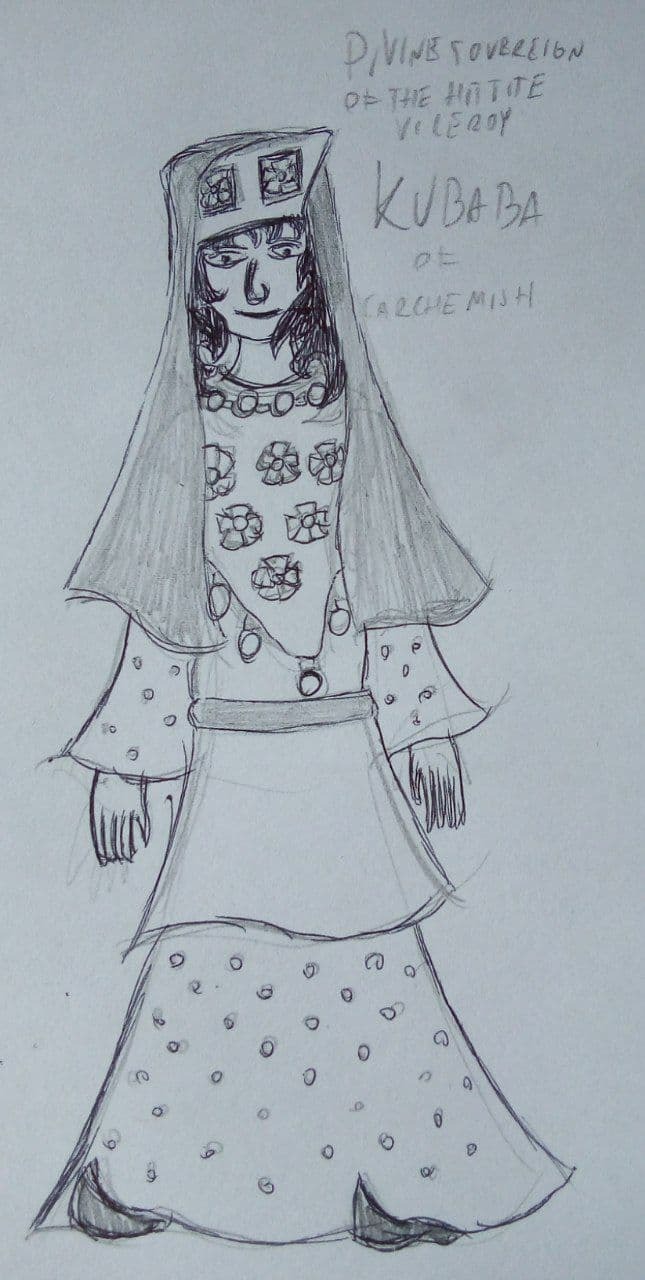
Kubaba – the head goddess of Carchemish; much like the king of Carchemish served as a Hittite viceroy taking care of affairs of the vassals irl, she acts as Teshub's ambassador in the southeast, mediating between the Anatolian and Syrian gods. She hopes that Baal's rise will normalize foreign relations to the benefit of her human followers – El's erratic behavior and sympathy for a number of widely detested figures made that rather difficult.
While she's not much older than Baal, she poses as an ancient deity and dresses like someone twice her age. She also seeks opportunities to insert herself into suitably ancient narratives. In another time and place she'll be known as Cybele, and eventually as the Roman Magna Mater, but this is not the story about it.
Plot-relevant but not present in the story physically
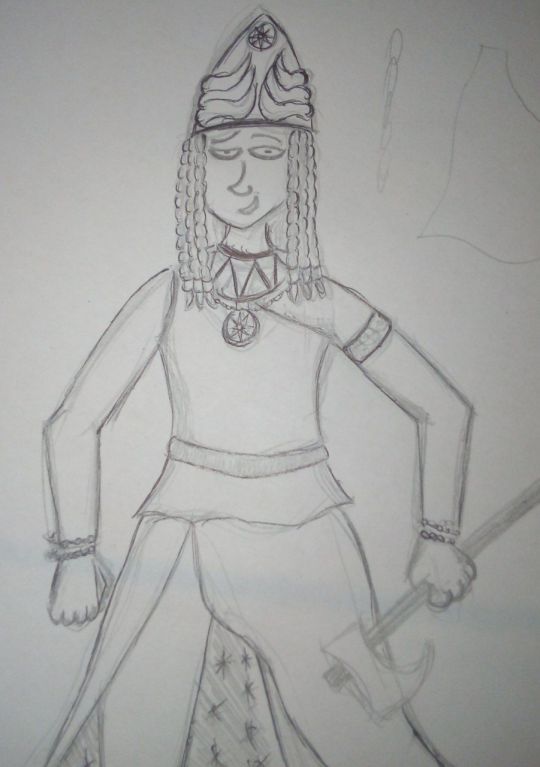
Inanna – the celebrity superstar of every pantheon from Hatti to Elam. After being elevated to one of the foremost positions among the gods she started a profitable franchising business, offering help with setting up own cult system and the right to use the title of “Ishtar” and the eight pointed star emblem in exchange for a share in potential profit and a spot in the franchisee' home pantheon. As her fame is unique even among the greatest of the gods, this isn't that bad of a deal. Other benefits of the franchising program include free tickets to the annual Ishtar meetup in Uruk and a 24/7 tech support line ran by her sukkal Ninshubur.
Asides from Astarte, prominent members of the franchising program include the Hurrian Shaushka, the Elamite Pinikir, and the night goddess of Kizzuwatna.
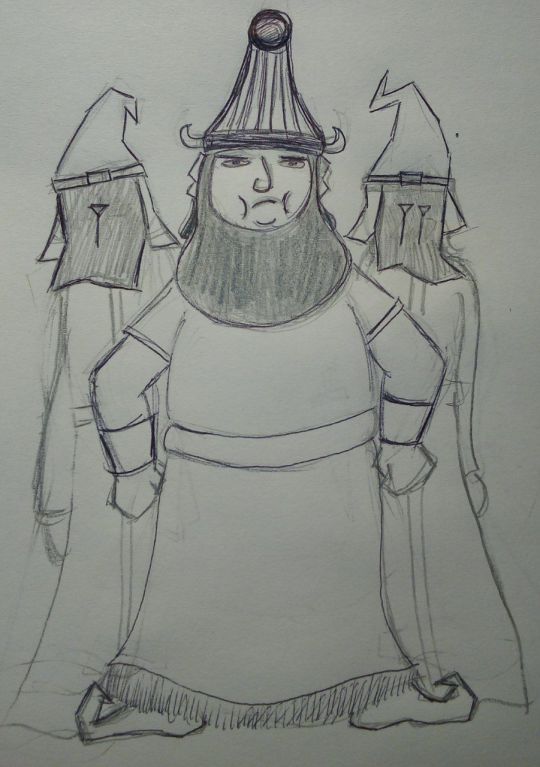
Kumarbi: an agricultural god of the Hurrians who seized the kingship of their pantheon violently before being overthrown himself by Teshub and his allies. Now he resides in the underworld and plots, aided by a network of allies – some opportunistic, some stupid, some simply malevolent.
His will is usually carried out by an unspecified number of identical fate goddesses, possible to differentiate only by the numerals on their veils.
At the core he and Baal's father Dagan are very similar gods in function, but not in temperament.
22 notes
·
View notes
Text
Books, July - August 2020
The Lawrence Browne Affair - Cat Sebastian [interesting: I liked this a whole lot more on rereading than I did the first time]
Notes from an Apocalypse: A Personal Journey to the End of the World and Back - Mark O’Connell [much funnier than I expected a book featuring this many libertarians to be; also, god damn Ayn Rand and her community- and compassion-fearing nihilistic fanboys]
Queenie - Candice Carty-Williams
Solitaire - Kelley Eskridge * [the only surprise is that I waited until Day 111 of isolation to reread this]
In Praise of Paths: Walking Through Time and Nature - Torbjørn Ekelund, translated by Becky L. Crook *
Her Body and Other Parties - Carmen Maria Machado
Crystal Line - Anne McCaffrey
A Children’s Bible - Lydia Millet *
Daughter of Witches - Patricia C. Wrede
The Song of Achilles - Madeline Miller [you know, I can understand why other people despise this take, but it worked for me]
Folly - Laurie R. King
The Forgotten Beasts of Eld - Patricia McKillip
Boyfriend Material - Alexis Hall [The novel version of spending Friday night home alone on the couch with red wine and French bread-and-butter. Highly satisfying in the moment, and ruthlessly wink-and-nod in-the-know about (a particular sort of) internet culture, in a way that means it should be read now and not later. Although it probably doesn’t really need to be over 400 pages long, I’m not sure what I’d cut, and anyway there’s PINING. (But also: I think this needs a warning for somewhat disordered eating, which is a) a minor but believable characterization detail, and b) not the point of the novel at all, but c) it nagged at me in a really unpleasant way throughout until it was acknowledged)]
An Extraordinary Union - Alyssa Cole
Spirits Abroad - Zen Cho
The Equivalents: A Story of Art, Female Friendship, and Liberation in the 1960s - Maggie Doherty
The Ten Thousand Doors of January - Alix E. Harrow
Something to Talk About - Meryl Wilsner
The Terracotta Bride - Zen Cho
Under Another Sky: Journeys in Roman Britain - Charlotte Higgins
Stormsong - C. L. Polk
On Earth We’re Briefly Gorgeous - Ocean Vuong
The Only Gold - Tamara Allen [new favorite terrible penis euphemism: “the instrument of contention”]
The Dispossessed - Ursula K. Le Guin
The Snow Queen - Eileen Kernaghan
Wives and Daughters - Elizabeth Gaskell [her character sketches, my god: ”Let Cynthia be ever so proud, ever so glad, or so grateful, or even indignant, remorseful, grieved or sorry, the very fact that she was expected by another to entertain any of these emotions, would have been enough to prevent her expressing them.”]
Fallen into the Pit - Ellis Peters
These Old Shades - Georgette Heyer *
The Genius of Birds - Jennifer Ackerman
Two Rogues Make a Right - Cat Sebastian [conclusion: the Sedgwicks are simply too wholesome for my taste, but I’m probably going to end up rereading the one with the vicar and the ducks anyway]
The Anarchy: The East India Company, Corporate Violence, and the Pillage of an Empire - William Dalrymple [dnf]
The Doctor’s Discretion - EE Ottoman
The Bishop’s Heir - Katherine Kurtz
The Life and (Medieval) Times of Kit Sweetly - Jamie Pacton
This Other London: Adventures in the Overlooked City - John Rogers [dnf]
Death and the Joyful Woman - Ellis Peters
The Glass Hotel - Emily St. John Mandel
The Order of the Pure Moon Reflected in Water - Zen Cho
The King’s Justice - Katherine Kurtz
Catherine House - Elisabeth Thomas
Flight of a Witch - Ellis Peters
Blackfish City - Sam J. Miller [dnf]
Crooked Hallelujah - Kelli Jo Ford
Devil’s Cub - Georgette Heyer * [on the one hand, it’s appalling that we’re meant to cheer for Dominic; on the other, chapter 18 is a comic masterpiece]
A Duke by Default - Alyssa Cole
The Night Watch - Sarah Waters
It Takes Two to Tumble - Cat Sebastian [just as I predicted! and I remain unconvinced by these ducks; after all, I have met a duck]
Hild - Nicola Griffith
Water, Ice & Stone: Science and Memory on the Antarctic Lakes - Bill Green [dnf]
Have His Carcase - Dorothy L. Sayers [I do appreciate how Sayers juggles tonal registers, in order to break up the novel’s prevailing humor - ”A solitary rock is always attractive. All right-minded people feel an overwhelming desire to scale and sit upon it.” - with those raging gratitude-and-obligation scenes and the occasional peek at decisions mercenary and necessary.
A Study in Honor - Claire O’Dell [there’s something interesting here about the world-building dangers of using the present to establish the near future with too much specificity - I know most the books Watson is reading; I like many of them; I realize they’re name-dropped in part as thanks and homage; and I still found myself thinking, “has no one written anything since 2015?”]
The Sugared Game - KJ Charles [no surprise, Maisie and Phoebe are my favorites...now kiss]
Sorcery and Cecilia, or, The Enchanted Chocolate Pot: being the correspondence of two Young Ladies of Quality regarding Various Scandals in London and the Country - Patricia C. Wrede and Caroline Stevermer * [yay!]
#books 2020#books practical and pleasurable#featuring the week in early july when everything was pleasing to me and the stretch of mid august when nothing satisfied
11 notes
·
View notes
Photo

𝕺𝖆𝖙𝖍𝖘 𝖔𝖋 𝕷𝖔𝖞𝖆𝖑𝖙𝖞||TLK Fic|| FinanxOC||Three
AN: Hey! I just want to give a big thanks to everyone who has left feedback and read so far! Sorry that there’s not a whole lot of Finan in this chapter. I’m trying to bridge the gap between the end of Season Two and the beginning of The Burning Land here. I hope we're all staying safe and healthy :)
Taglist: @lauwrite1225
let me know if you wanted to be tagged for updates!
||Masterlist||
Summary: Tove chose to surrender rather than be killed, after Sigfried was defeated at Beamfleot, giving herself up to the mercy of the Saxons. Thanks to Finan’s intervention, her life is indeed spared and she is brought into Uhtred’s service. With the sting of defeat fresh on her tongue and her new life fighting for the Saxons secured; Tove is left wondering what tricks the Gods have in store for her next.
chapter warning: minor description of ancient medical practices
Words:2471
-----
It turned out Finan was correct in his thinking that the bandages had been wrapped too tightly. In the morning, her side ached something fierce and the bruising had darkened to a near black. It was impossible to say whether the healer who had wrapped the wound previously had simply made a mistake or if their actions had been motivated by general hatred of the Danes. Either way it was of no consequence because when Finan came with Uhtred to check on her they both agreed; she would need further treatment. What neither of them spoke out loud was their uncertainty as to whether she would be able to travel with them in a few days’ time.
Tove sat half propped up by pillows when the healer Osferth fetched was led into her room. Even with the war paint washed from her face, the expression of frustration on Tove wore was intimidating as she fixed her gaze on the short man. In addition to a healer, he was also apparently a priest which was denoted by his robes and the sizeable wooden cross which hung around his neck. A short and wiry man he became uncomfortable under the weight of Tove’s gaze. Wringing his wiry fingers nervously, he could not meet her eye. Instead his watery eyes flicked from his clearly displeased patient to her Lord who stood leaning against the far wall arms crossed.
“W-what appears to be the issue, my Lord?” he inquired in a painfully squeaky voice, his question was not directed at Tove but the Lord Uhtred.
“Am I the one lying in a sick bed?” Uhtred responded flatly, though it was clear he gleaned a certain amount of amusement at furthering the healer’s discomfort.
“O-oh no, no of course not my Lord.”
Hesitantly the healer turned and approached Tove’s bedside. He hovered there for a moment. Until finally, with a dramatic sigh Tove rolled up her tunic to reveal the dark bruising that painted the side of her ribcage. As though woken from his nervousness suddenly by the sight of her wound, the healer drew closer to examine it. Her eyes followed his every move as he probed around the edges of the bruise and hummed thoughtfully to himself. Every prod of his fingers caused her to tense with pain though she made no sound.
All the while, out of the corner of her eye Tove could see Uhtred and Finan waiting patiently against the far wall. Uhtred merely watched with interest as the healer examined her. Meanwhile, Finan seemed somewhat tense at the sight of the damage he had caused. No one spoke until the healer sat back on his stool with a determined expression on his face.
“Well?” Tove asked expectantly.
“Well…,” began the healer earning an unimpressed look from Tove. Though, despite it he managed to push on. “I do not believe the bones are broken, Praise God. Though, it does appear the wrapping has served to deepen the bruising…causing blood to collect under the skin. Minor bleeding and holy water may alleviate your pain and aid in the healing.”
The squeaky quality of the healer’s voice and his heavy accent caused her to furrow her brow in confusion.
“What?” she asked.
Uhtred cut in though before the healer could attempt to explain himself further.
“He wants to bleed you,” Uhtred said in Danish. “And pour their Christian magic waters over the wound.”
Tove’s eyebrows shot up. “Magic waters?”
“Yes, they say it is blessed by their God.”
The healer waited as Tove considered the treatment. When she finally nodded her assent, he reached into a satchel and brought out the necessary implements. A small flask filled with clear water, a knife, and some cloth.
Bleeding, though unpleasant, was not an unusual treatment for such a wound. So, with that agreed upon the healer ushered Uhtred and Finan from the room to do his work. Despite the routineness of the procedure it did take some time to complete as all the bad humors had to leave the body through the blood. The healer made two medium size cuts across the bruised area and allowed the blood to flow until it was little but a trickle. Then he splashed the area with his magic waters said a prayer and pronounced the treatment complete. Though she was dubious of the effectiveness of the waters Tove gave a nod of thanks to the man as he rewrapped her ribs.
When he was gone Tove allowed herself to fall back into a light sleep which lasted for several hours before a knock came at her door. In her grogginess she only managed a grunt in reply. Though it was clearly enough for the door opened a moment later to reveal Lord Uhtred with a pitcher of ale and a platter of food.
“My Lord,” she said, attempting to push herself up into a seated position.
“Rest,” Uhtred said simply indicating there was no reason for her sit up. “I am only here to bring you some food.”
“Thank you.”
“And to discuss our impending journey to Lunden,” he added.
Her stomach sank.
“I will be well,” Tove said firmly.
Uhtred looked at her for a long moment.
“The healer does not advise you to travel on horse back for some weeks,” Uhtred said finally.
“My Lord!” she began to protest.
“So, I’ve arranged for you to ride in a cart. As I imagined you would not like to be left here until you were fully healed?”
Tove’s eyebrows rose in surprise. It was apparent the Lord had anticipated her fear of being left behind. A wave of gratitude swept through her causing a smile to spread across her face. Traveling by cart was certainly not ideal and indeed a tad frustrating for a warrior, but better to concede than to not be allowed to travel.
“Thank you, my Lord!” Tove exclaimed vehemently. “You are a good man.”
Uhtred chuckled. He patted her shoulder lightly and then made to excuse himself. At the door he left her with the firm order that she should take as much rest as she could in the following days.
-----
Their journey to Lunden was longer than the one to Wintenchester and though Tove would have rather enjoyed it from horseback she felt somewhat grateful for the cart. Her ribs had begun to heal properly after the intervention of the healer’s treatment, but she was still sore. The cart jostled somewhat along the road at times though the driver did his best to keep from going over any great bumps. Overall, it was a comfortable and relaxed journey.
As they rode, she heard about the fate of the Lord Odda and learned about what they would be doing in Lunden. Apparently, the Lord had decided to take his own life rather than allow himself to be executed. It was speculated by some of the men that the Lord had done it as a kindness to his friend the King. He had not wished Alfred to be forced to order his execution. She found it somewhat sad. An opinion that was not shared by some of those in their party. They explained to her that Christians believed to take one’s own life was a sin and that the Lord Odda would now be burning in hell for this sin. Like the crime he was to be sentenced for this made little sense to Tove; it seemed Christians loved to punish themselves.
What a strange God these Christians have.
The topic of their duties was however much more interesting to her. Since arriving in Britain she had spent much of her time at Beamfleot where the Lady Aethelfled had been held. She knew the Thurgilson brothers had held Lunden briefly and used their advantage there to capture the Lady, but Lord Njal’s crew arrived too late to see that city. It was said that the place thrived with trade and life even more so than Wintenchester despite having switched several times between Saxon and Danish hands.
Half the place was built by an ancient people called the Romans who had, similarly to her people, invaded Britain hundreds of years ago and that their buildings were made of the same great stones as the palace in Wintenchester. Though, as Uhtred put in much of the stone was in decay and Saxons did not often inhabit the Roman buildings for fear of their ghosts. Much of the population lived within the old Roman walls but had instead decided to live in their own wooden structures.
It would be Lord Uhtred’s job to see to the security of that city. Now that it was back in Saxon hands, particularly Mercian hands, Alfred wished for it to stay that way. So, he had given the city to Lord Uhtred which was interesting to Tove as Mercia was supposedly ruled by a Lord of Mercia -Aethelred. Regardless she was pleased to be there and excited for what awaited them.
When they arrived, they were met by a Saxon called Bishop Erkenwald who did not look overly pleased to be receiving them. The Bishop greeted Lord Uhtred begrudgingly and led them into the city. Inside the gates another man, a priest by his look, was instructed to show the household warriors to their lodgings. All of which were situated in the Roman quarter of the city near their Lord’s home that looked out onto the river Temes. It was late afternoon when they arrived, and they were left much to their own devices as their Lord attended a meeting with the Bishop.
That suited Tove well enough as she was eager to settle into her new home. It was a small place, but that made no difference to her. She did not need a lot of space and a larger home would have made her miss her family too much. During their journey she had had plenty of time to think about her family and it saddened her to do so. Kåre’s child had likely been born some time ago. She wondered if it was a boy or a girl. But thinking about that only led her to wondering how Inga was doing and whether her sisters were helping which left her with a deep ache in her chest. It was likely that after not returning she would be eventually presumed dead since she had no way to send word to them.
So, instead of allowing those thoughts to seep in she cleaned the new place as best she could. There was still some mild pain in her side that made stooping difficult, but she managed to sweep the floors of dust and organize her meager possessions. When all that was complete the sun had sunk fully below the horizon. Despite her desire to explore the city, Tove decided she would have an early night and went to sleep after a small meal of bread and hard cheese.
A few weeks after their arrival, Tove was finally allowed to join the men in the training yard. After having been stagnant so long she was eager to get back to what she did best. It had been enjoyable getting to know the wives of Uhtred and Sihtric, but housework was not for her. She was a shield maiden.
“Don’t go easy on me,” Tove said firmly to Osferth as she tossed him a sword.
Admittedly she had been looking forward to sparring with Finan since the battle at Beamfleot, but he was not there. Apparently Uhtred had required the Irishman’s presence on some errand elsewhere in the city. So, Osferth would be her sparring partner for the afternoon.
“Yeah Osferth. Best not let yerself be beaten by a girl,” Sihtric jeered.
“Careful Sihtric or you’ll be next on my list for humiliation,” she joked.
Sihtric snorted. She turned back to Osferth who held his practice sword at the ready. A small smile played at Tove’s lips as she surveyed him. Osferth was too good of a man. Many others would have taken advantage of her distraction to begin the fight and so catch her off guard, but not Osferth.
“When you’re ready.”
Tove did not wait. Immediately she went for the opening she saw in his guard, but Osferth parried knocking her blade away. Gritting her teeth, she went in again and again she was parried away. Five or six strokes in Osferth began to make his own attacks which Tove parried with just as much practiced ease. It went on like that for some time. Both their faces glistening with sweat, grunting, and becoming tired with the speed and intensity of the fight.
Until she saw it. The same opening Osferth had shown when they began -except this was not so intentional. The young monk knew where his weaknesses were, and he had shown them to her to draw her in. But now he was tired, and she was wagering he would not be able to react so fast as before. So, she went for it lunging blade first she poked him in the stomach with the dull tip of her blade just hard enough to make him double over.
“Dead,” Tove proclaimed with a heavy exhale and a wide grin on her face.
-----
Up on the balcony of Uhtred’s house stood Finan and the Lord himself surveying the training yard with interest. They had had an errand to run earlier in the morning, but on its completion Uhtred asked Finan to observe the training yard with him. Uhtred knew it would be Tove’s first day back to train and he was interested to see how good she was -as the only direct witness he had to her skill was Finan. Though, he did not want her to know he was watching thus the balcony.
“Seems you were right,” said Uhtred as they watched her ‘kill’ Osferth.
“Seems Osferth still needs work on that guard Lord,” Finan added mildly.
Uhtred nodded. Out of the corner of his eye, he was watching Finan watching Tove. Back in top health, Uhtred would not deny that Tove was a beauty. Had he not been so deeply in love with Gisela he might have wanted her, but nothing could turn him from the love of his wife. Still, he recognized the gleam of interest in Finan’s eyes and he had seen his friend’s discomfort at the sight of her wound back in Wintenchester.
“What made you spare her at Beamfleot?” Uhtred asked suddenly.
Finan’s brow furrowed at the question. Turning his eyes away from the training yard below, he only managed a shrug.
“Ya wouldn’ have killed someon’ who yielded would ya Lord?”
“No,” Uhtred said. “Still, you couldn’t have known if she would give her oath.”
“I had a feelin’ Lord.”
19 notes
·
View notes
Photo

EXPRESSIONS IN THE TIME OF COVID-19
“Gahi’g ulo” (Stubborn!), “Gikapuy nako aning kahimtang nato” (I’m tired of this situation), “Kalami na ilaag,” ug “Ga-hasol-hasol raning COVID”
Complaints and disappointments constitute the daily life of most people in this time of pandemic. This pandemic cripples our normal way of life and has certainly tested our patience. Indeed, this COVID-19 pandemic is making all of us tremble in fear, exposing our vulnerability, and on top of it, testing our faith in humanity and in God. But undoubtedly, too, if we bother to listen and look into things that are not so obvious yet are also happening, it also makes us realize a lot of things from a vantage point of view. It tells a lot about us and a lot around us. How about you, are you one of those who still clings on to positivity? Or one of those who has already fallen prey to exasperation and frustration?
Now, instead of just merely echoing complaints and making noise out of disappointments, I would like to give another look at the expressions mentioned above and make a juxtaposition citing few common biblical instances. From here, I’ll endeavor to draw lines to help us weigh in on helpful and practical insights as we face this pandemic and brace ourselves for the ��new normal.”
“Tigas ng ulo”
“Tigas ng ulo” is a common expression that many have carelessly thrown without even analyzing the situation the people they are criticizing are in. Many of these people literally cannot afford to stay at home, for they live “isang kahig, isang tuka,” and, therefore, “kung walang kahig, walang tuka.” Ironically, many of those who use the term are the same people who can’t help but drive to expensive coffee and milk tea shops which remain open. We try to put ourselves in the shoes of the poor: imagine living in a small room with no air-conditions or electric fans in the heat of the summer while brooding over where to get the next meal or payment for our rent and debts after all the government assistance shall have run out. Social inequality is so vast that we cannot just simply dismiss the situation of those living below the margins.
We go back to when Jesus lived his earthly life. The apostles whom He chose were people coming from different backgrounds, and most likely were hard headed themselves. There was Peter who at first refused to cast his fishing net even at the order of Jesus. There was also Thomas who was naturally skeptical and stubborn. Nevertheless, these were the same people he told to “go to the world and spread the good news of salvation.” Did Jesus confront them in anger? Or in demeaning manner? He didn’t say, “ANG TIGAS NG ULO NYO!” But instead Jesus accepted and understood them. The only difference between us and Jesus is that he did not leave his work just that; He enlightened them and taught them ways. He did not say to Thomas, “I pity you for your lack of faith,” but rather, “Come, touch my wound that you may believe.”
We should also do the same as Jesus did. Instead of always ranting and putting the blame on others, why not help those in need? Instead of telling them “ang tigas ng ulo nyo,” why not try to understand their situation first, then try to enlighten them on what to do? Most of them are also confused trying to fight a battle defenseless, something that we always tend to overlook. We cannot blame them, it’s the lives of their children and theirs that are at stake. Yes, it is true there are a lot of hardheaded people; but the thought of solving it through rants and skewed judgments would only usher in hatred not solution. These stubborn people are the same people who hope. Instead of dragging them down, why not let our hearts be open and help realign the ways for their hopes? Yes, being hardheaded during this time of crisis is not commendable… and so is having a heart of stone for others.
“Gikapoy na ko ani atong kahimtang. Kalami naman lang gyud ilaag. Hasula na aning COVID -19!”
Tired, powerless, stressed, delightfully frustrated, and the likes are the feelings we often associate with our COVID19 situation. Is it really just that or the fear of the uncertain? We go out for our grocery, fall in long queues, and observe 1-meter distance and other measures, then a question enters our thought, “How long will I keep doing this?” We are comfortably seated at home then one of our family members innocently asks, “can we go to the beach, if not then shopping would do.” Our normal way of life has been affected. Apart from the uncertainty our life holds, we are all dealing with another yet more troubling uncertainty and we have nothing to tell ourselves except “Hasula na!” or “Kakapoy na ba!” Yes, it’s true we are tired of this COVID19 situation, especially with the extension of the enhanced community quarantine. I also would admit “gikapuy nako aning kahimtang nato.” But I realize, instead of spending time thinking of what’s not even there, we think of things real and get involved in them as we supposedly should. This is the time time to be with our family, to learn new things, to reflect, and to pray. As I was watching my family doing some household chores together, I realized that this pandemic has fostered values we have not seen and experienced for a while. While at home, we can also learn new things like engaging in workouts, listening to (or playing) music, or better yet reading books or Ebooks for us to exercise our mind and widen our knowledge and understanding of things. It would, however, all the more be better if we spend time for prayer and meditation. With rising toll of confirmed cases and deaths, fake news and misinformation mistaken for truth, hoarding and other selfish activities unmasking people’s identity, prayer is a necessity. Yes, it’s true. “Gihasol ta aning COVID-19” but if we come to think of it, apart from the unpleasant and discomforting things which our eyes are glued to, things start falling back to places: the recovery and healing of nature; the perking up of interdependence among man and his fellow human beings; the celebration of life over disheartening excessive emphasis on economy; and faith in our own humanity. Billionaires sharing a part of their fortune, small and big companies reaching out to their workers, and other private individuals helping out through cash aids and food packs, all these are becoming a narrative of a living humanity.
Biblically speaking, our experience is never new. The Old Testament Israelites spent 40 years in the wilderness before finally reaching the promised land. Noah and his family kept floating for 40 days and 40 nights. I could just imagine how seemingly hopeless those 40 years were for the Israelites and if they surrendered, everything they started would have just gone into waste. As for Noah, getting stuck inside the Ark for 40 days is one thing and not knowing where they will be led is another. In the New Testament, Jesus was fasting and praying for 40 days, and at the night before he was betrayed and arrested, he was patient and praying constantly. Then there is the Cross, a knowledge he brought with him for more than 30 years. The Cross that Jesus carried to Calvary reminds us that Jesus is with us, journeying with us in our suffering and seeming hopeless situation. What the biblical instances show us is that we can always make our way through suffering and that our situation is a matter of making it meaningful. But how can we make our frustrations, stresses, anxieties, etc. meaningful? It depends on how you define meaningful but as for me, I do it by cooperating with the authority, spending quality time with my family, extending little extras I have to others, keeping myself busy with real things, and most especially, by praying for the welfare of everyone affected by the pandemic, the front liners, those infected, and the poor who are the most affected due to lack of financial means. Admittedly, not everything is under control and not everything is negotiable by any material wealth. There is always what we call “fallen short” but the good thing is, there is somebody who can make up for all the shortcomings. Unless we spend time for prayer, there will never be enough. Having said this, why not, instead of saying “gahasol-hasol ning covid oy! Lami na baya kaau ilaag,” and instead of thinking of going on vacation, why not say “after covid-19 I want to go to church to praise and thank God for giving me another life?” I assure you, it does make a huge difference.
I would like to end this reflection with a simple prayer.
Lord, guide all of us in this time of the COVID-19 pandemic, protect us from its infection. To those who are infected and battling for their lives, help them and touch them with your healing hands. Help also the poor that they may find what they need and guide them in everything they do. Lord, give us grace and guide us all, especially our families, friends, and those front liners as they fight to curb the spread of this pandemic.
Beloved Mother, help us realize that we are all one great family. Unite us in fraternity and solidarity so that we can only think of helping one other. Lastly, make us strong in faith, persevering in service, and constant in prayer. Jesus, Mary, and Joseph, guide us always. Amen.
(Published on May 22, 2020 - Bag-ong Lungsoranon - The Official Newsletter of the Roman Catholic Archdiocese of Cebu, Philippines)
1 note
·
View note
Text
Cinder and Neo an unlikely friendship
Hello dear followers, here is a new review about RWBY but this time we will talk about the hated Cinder and how the structure of her character took her next to the beloved Neo and how this dynamic is unique to the character of Cinder.
As you know, in this volume we have had great dynamics.
The development of the Bumbleby
The companionship between Mercury and Emerald
The closing of the JRN team with Phyrra
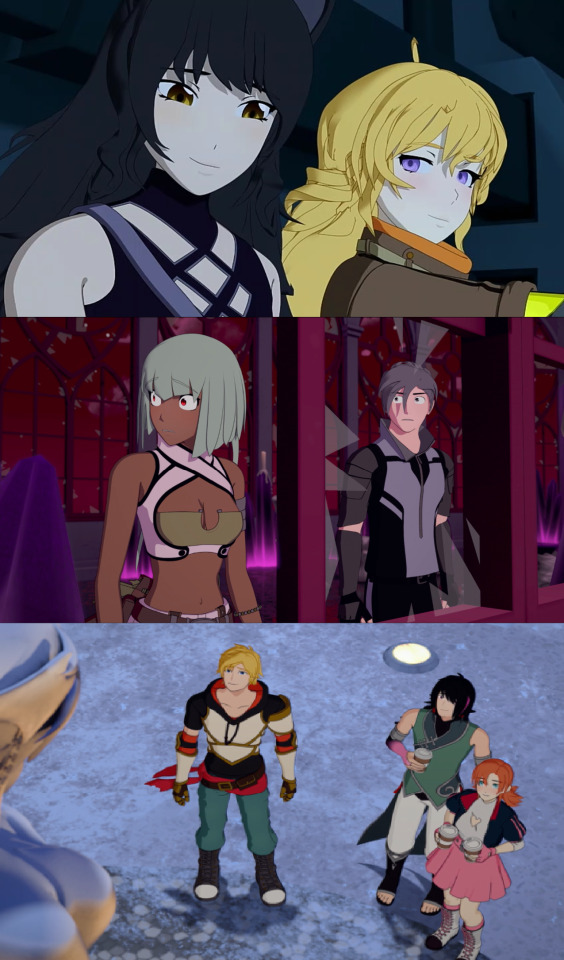
but I think the fandom ignores the duo of Cinder-Neo and it's understandable...in the long time I've been in this fandom there are 2 things that always stand out:
-The hatred of Cinder and the love of Neo
Although the coolest thing about this is that Cinder and Neo are apparently the most opposite villains of the show.

If this is true, how could this be the perfect team? ... although many do not believe it, just like other great RWBY dynamics, the very opposite character of both leads to that point.
That is why I will explain the fundamental characteristic of the character of Cinder
Cinder has no companions
Many believe that their "ambition" for power is their main characteristic ... but I do not think so...being honest the Cinder of the first volumes is very good villain (conspires very well, kills without mercy, manipulates, subordinates) besides that 90% of their plans were successful
-Engaging everyone in the School
-Reclude to those of the White Fang and Mercury-Emerald
-It made the people distrust the established order and cut communications in the world
-Destroy Ozpin
-Consided the powers of the Maiden

But even with these achievements and his power, I must say that she would have had total success if she had friends ... but of course that at that time was not possible.
In the first 3 volumes Cinder was authoritarian, not only did She not have respect for his subordinates, but she made them know ... let's just look at how he treated Emerald and Mercury (especially Emerald who was like a lapdog) and scenes not missing.

Even Roman who does not treat him as a dog but as an ally but who is also subject to her and has control over him ... it was interesting as from the first chapter this was clear
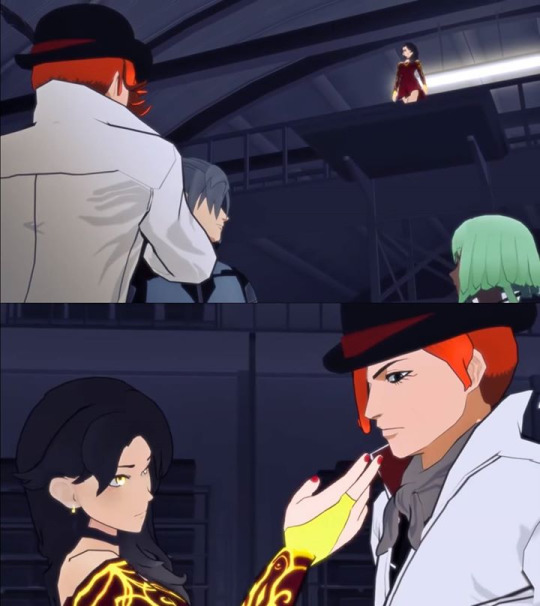
Each event is moved according to its threads and that makes it feel very good ... but at the same time you can notice that lack of true companions.

In the final stage of the operation she could easily have said that her subordinates escorted her ... but she was so confident in her own power and wanting to take away the glory that that became her only mistake in her entire plan, since Mercury and Emerald could have stopped Ruby or any other intruder...the story would be different, but she never saw them as "peers" they were just her pawns.

the duel between Cinder and Phyraa is epic ... but the first clue to Cinder's belief base is when our beloved champion says "You believe in destiny"
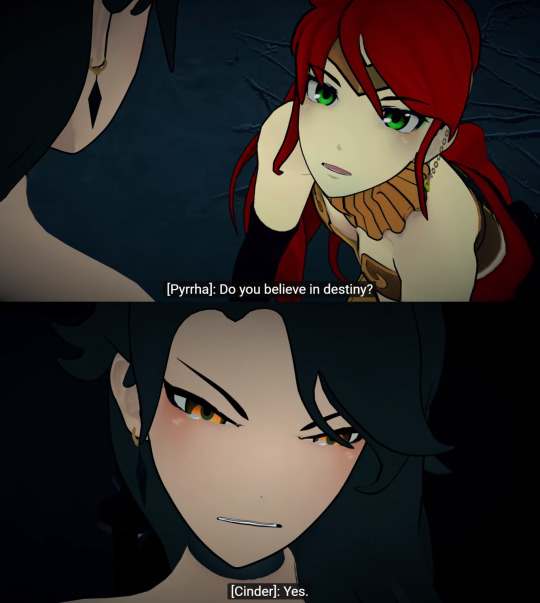
The phrase that Phyrra told her before his death makes a lot of sense in Cinder narrative, but that will be discussed later.
After his defeat at the last moment we see her at her worst moment in Volume...but the first action we see of Cinder is that she continues to treat her subordinates in the same way.

The members of the Salem council are not even close to real comrades, in fact they bothered her a lot because of her condition ... especially Tyrion that is a reminder of what would happen to her if she did not kill her power and that attitude so " unpleasant "that we know.

Her relationship with Salem is interesting ... it is obvious that Cinder is very afraid of her, but at the same time the Dark Lady treats her differently than the other members of the council ... although the mistakes are not allowed even for her.
it is clear that this is the relationship that defines it and made who it is now, in fact there are many parallels between the two but that is for another post
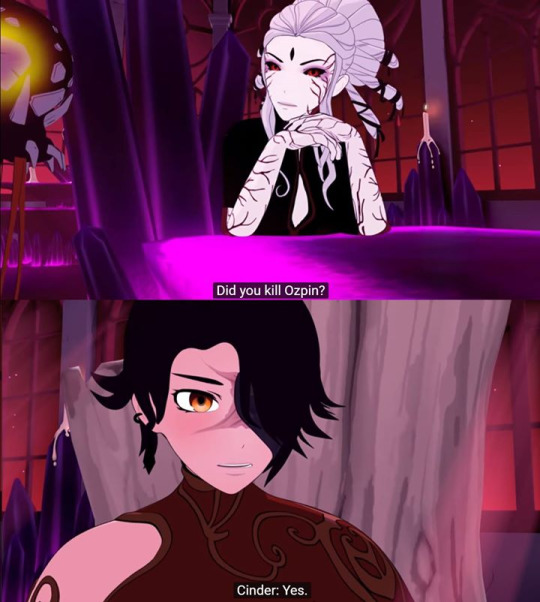
The times she appeared in that volume we can see clearly why she always has to emit an intimidating and clear presence to be as she is ... because they would literally eat her alive if she did not, her fear is quite genuine.

In the Volume 5 to recover Salem gives his orders and just responds to the stupid criticism of "Cinder forgot his hatred for Ruby and was the same again" when this is a lie, Salem ordered Cinder keep her alive.

Ruby why did not I pay attention?" When she made the deal she did not want to kill Ruby, since she has a mortal fear of Salem is obvious. ..but that does not mean that she could not "hurt her”. It means killing her uncle, her friends and leaving her hopeless ... just for that reason she accepted those conditions

In fact, it stands out in the end of chapter 12 again. Why does the fandom want it to do things that have no logic? ... Volume 4 showed us what would happen to Cinder if it "lost its usefulness" and, of course, if did not have the attitude that she possesses could not survive in the Salem council

Now Cinder defeat in the end. Why was it? It could be said that the same as in Vol 3 but there is a slight difference ... in this case the Narrative focuses on how important it is to have real friends (Something that Cinder does not have).
In fact the song of All Must Die describes its cycle of self-destruction and does not justify it but transmits its errors...The Cinder we met died

How does Neo enter the narrative of the new Cinder? How does Neo enter the narrative of the new Cinder? ... to understand the best quality of Neo.
Neo and Roman
I think they were duo of Villains par excellence were Neo and Roman ... neither of them had a toxic dynamic and best represent the dynamics of equals that many partners do not have ... From the beginning she is a villain who has what Cinder never had.

In fact since the first appearance of Neo is also established that she is stronger than him and even so is his partner without being the boss.

I still remember the beating she gave on the train to Yang and as always Roman never gives him "orders" besides that of the 3 duels on the train she was the only one to win with an overwhelming advantage.

In fact the capture of Roman was because he was very weak against Blake...Neo unlike Cinder does not ambition the "Power" in fact he looks well satisfied in his adventures with Roman
Again in volume 3 our beloved Neo saves his boss, without orders from Cinder or from Roman himself and in fact the sentence that Roman says in his release tells us that they have passed this situation many times and Neo was simply going to save his friend

The team of Neo and Roman was very lethal ... in fact it is the second best combo I saw in the series, they beat Ruby ... but we know how the battle ended (Death of Roman) Neo lost his boss and dear friend, now the only thing she wanted was to take revenge on those she considers responsible for Roman's death.
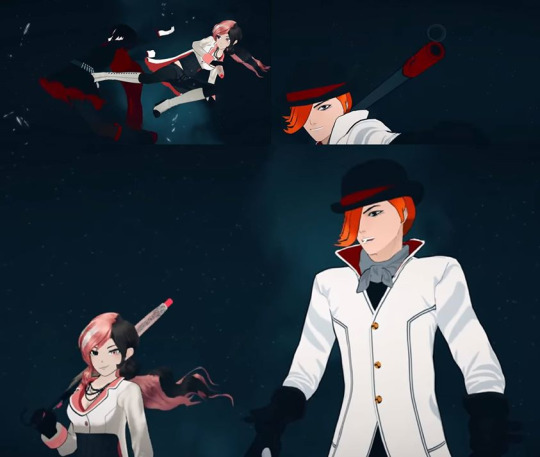
This series of events would be those that would take Neo to his predestined meeting with Cinder
Cinder and Neo Vol 6
In this Volume the new Cinder comes into action, unlike before it is not the same. Why do I say it? Even in her weakened state she was still next to Salem, she still had subordinates, she was still part of Salem's plans ... but in this volume it is very different.
-It does not have subordinates
-Salem abandonment
-It has no more allies
-It has no room
- Now seek to eliminate it.
With that in mind, she only has two motivations (Revenge and Survival), she searches for the information and meets Neo that in a certain way has not changed anything, the only thing that she lacks now is her great companion... in fact she honors a lot Roman memory.

What I like about this scene other than the great fight ... is that unlike the way Cinder recruits Emerald-Roman-Mercury here Neo not only does not see her "Fascinated" with Cinder but they have an agreement in base to a common goal...even the small scene where she points out that she is mute is a small advancement that her dynamic of both will be very informal
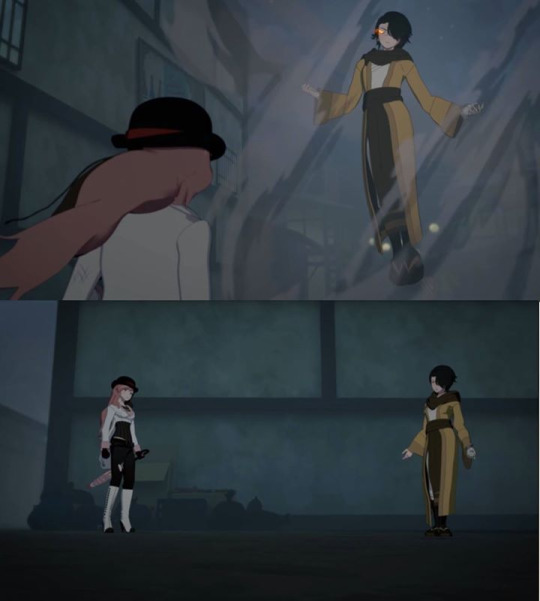
At the moment they seal their alliance they do it as "Equals" unlike their other alliances, many said "Look at a parallel with what happened with Raven ... I bet she going to betray her" ... but here the circumstance is the opposite.
In this case Cinder has no allies, has no subordinates, has no place to return...instead with Raven had Allies, the Base of Salem, her Subordinates she made that alliance not in a committed way, in the chapter Raven itself she talks about betraying her ... so that alliance does not even remotely follow her.
In this alliance not only Cinder lost almost everything that makes her feel "powerful" but really has no reason to betray Neo ...in fact unlike the situation with Raven ... here Cinder spends time with Neo because ( she has no one else) It is ironic that his whole life led him to spend time with someone who tried to kill her weeks ago ...but thanks to that, she is already forming what could be Cinder first Friend.
this is the character development that many were waiting for

In fact, something that many forget is that the first time that Cinder and Neo interact, both praise each other without underestimating each other while Emerald and Mercury are back as subordinates and they are together as equals is a well done scene.

I liked the scene where Neo stops Cinder without fear of being "reprimanded" (Cinder surprised face is great) in fact that scene suggests that she got the transport without orders from Cinder because she does not order , but I also like it when Cinder makes a sarcastic comment about that Neo lacks boots and this one rolls his eyes without fear or anything because she is not faking anything in front of her

But at the same time she shows her happy side without problems and unlike Cinder's subordinates, Neo is informal with her and I love it.

But at the same time we also have Cinder showing expressions that in other volumes she did not show, without arrogance just enjoying time with his partner

I think the cherry on the cake was when Cinder tells Neo without reason the phrase of "Destiny" whichs she did not do with anyone, in fact she never talked anything trivial with anyone, it's great because despite all the events she is satisfied with what happened and that both are united in the goal of killing Ruby

It is an irony that as with Cinder and Neo ... the subordinates of Cinder (Emerald and Mercury) even in the midst of their hostility are forging a fellowship due to the circumstances, in addition to discussing something that all the fandom knew (Cinder not cares about his subordinates) Is not it ironic that right in this volume we see a new facet of Cinder that she did not have with them?

Conclusion
I know that many assume the worst of Cinder because of the hatred that fandom has ... but I think many have lost perspective of their character and the same happens with Neo but in reverse...She is not "calculating" all her actions, but the dynamics she has with Cinder came naturally and it's great because is happy now to have his first partner and we will see how they will develop their dynamics in the future and I think that Neo will be the one that makes Cinder learn the meaning of companionship and having a friend even though they are both villains
Many wonder: What is Neo past? What is Cinder past? well now that we have them together, this will be answered in the next volume.
228 notes
·
View notes
Note
What's your most recommended book? Other than the cruel prince or sjm books... You know what, how about a list? In order from best to worst. 1- best, 10- worst
all righty, I’m not gonna lie here, I have actually… never read any SJM books. Haha, never. I don’t plan on doing it eventhough they sound really fun, but right now I’m trying to gravitate towards a little more… I dunno, quality literature, if you will? This sounds so hypocritical and snob ehhh especially from my Cruel Prince fanblog but asdhjkjss don’t judGE
ok for the list I went on goodreads and looked at my read book list and picked out the best ones, but I honestly can’t really rank them, they are all great so the numbers don’t really matter, but they are quite different in genre, most of them are not even YA, so bear that in mind
1. Game of Thrones series by George R. R. Martin - hahaha GoT is amazing its kinda brutal and its a heavy read, but it’s really worth it. I love the way GRRM builds plot and characters, it’s just so unique and very different from everything I’ve read before. The characters are just so real, and they all have their own background stories and motivations, and you literally have no fucking idea what’s going to happen, it’s so unpredictable I can’t handle it. Warning, it’s likely that your fave character is gonna die, prepare yourself. I haven’t seen the tv show but honestly the book is really really great. It’s one of the best series I have ever read. BUT if you can’t stand visual violence, rape, insides getting, um outside, well I wouldn’t recommend it then. Because there’s a whooole lot of that.
2. HaRRy Pottah by J. K. Rowling - do I even have to explain. HP isn’t just a book, it’s a fucking life changing magical journey that every child should go through, so if you haven’t yet, shut up and go read it. For real. Go, turn off your computer and start reading.
3. Nutshell by Ian McEwan - now this is a really interesting short novel. The thing that makes it fascinating is that it’s narrated by a baby. Who’s still in the womb. And it’s actually a Hamlet retelling, where the pregnant mother is having an affair with the father’s brother, and you know, the baby knows about it. And when mommy and the brother lover conspire to kill the father the baby can do basically nothing about it so it’s about the child’s inner dialogue and some deep philosophical thoughts while his mother and uncle commit the murder and how the baby tries to sabotage them. It’s not YA for sure, so if you want steamy romances or a sexy protagonist, this is not your book, but I really loved it and it’s just such an intellectual book with some nice Shakespeare and modern political references and honestly just reading the dumbass shit that Claude (the uncle, parallel to Claudius) says was so goddamn funny. There is some sex and swearing in it. And like, after reading it I felt like such a highly educated person, eventhough I’ve never read original Hamlet haha.
4. Hunger Games by Suzanne Collins - dystopian post-apocalyptic novel, with some teenagers slaughtering each other, a cool protagonist with badass hunting skills, love triangle, rebellion, etc. Probably most of you have heard of it (if not already read it), it’s quite good, especially the first one, I personally wasn’t a big fan of 2nd&3rd, but it’s prob because I don’t like rebellions/civil wars for some reason? it’s good though!!
5. Angelfall trilogy by Susan Ee - ohohohh anGELS!! I used to be fucking obsessed with angels and demons (#FuckMeLucifer) and I’ve read every angel-themed YA book I could find, and this one was probably the most well-written. It’s set in a post-apocalyptic America (haven’t heard of that before) where angels are terrorizing humans and basically treat them like shit and this girl Penryn, her lil sister gets kidnapped by the angels, but in the fight this one handsome angel gets injured, they cut off his wings and she kidnaps him to her place and I think forces him to help her get her sister back (?) Turns out its Rafael the powerful archangel and of course he is hot as hell, so yeah its been a while since I’ve read it but I remember liking it, so if you’re into angels and some post-apocalyptic chaotic setting on top, you’ll probably like it
6. Mistress of Rome by Kate Quinn - so this one’s mainly about a Jewish slave in the Ancient Roman Empire and a lot of stuff happens to her and she ends up being the mistress of the crazy emperor Domitianus who tortures her and it’s basically following the life of all these different people with different social statuses in Rome, (slaves, gladiators, senators, wealthy wives, emperors, etc.) and it’s really interesting how the relationships are forming between them and the best part is that its historically aCCuRate! ! ! So if you’re into Ancient Romans, this is a good one. Trigger warning for sex, rape, emotional and physical violence. ;)
7. And then there were none by Agatha Christie - this is some nerve wrecking emotional shit, about a group of complete strangers invited into this island manor where they are slowly getting murdered one by one by this psychopath whose identity is… unknown. The murderer is one of them, and is playing this scary, childish, psychological game with the others, but i literally had no fucking idea who the (s)he is until the last few pages, and i couldn’t sleep for a few nights after reading it.
8. Jane and the Man of the Cloth by Stephanie Barron - so this is about Jane Austen, eventhough it’s not written by her, but it’s based on her actual diary and true historical events, so it’s pretty much an accurate description of that period of her life. I guess I would call it a historical murder-mystery because she solves a case that happened in the town she spent her holiday in, but the focus is not really on the ‘thrilling mystery’ part, but rather on the historical background (British-French conflict), social links between people, and yeah just gives you a nice little glimpse into her world. The book is part of a series but this one’s probably my fave bc Jane has this thing going on between her and this handsome mysterious man and a fucking loooved it!!
9. Jane and the Unpleasantness at Scargrave Manor by Stephanie Barron - this is part of the same series, i think it’s the first one, but you can read them in any order, and it deals with a similar murder case as the other one and hahaha it has another mysterious, kinda rude gentleman who has a little thing with Jane and in the end it doesn’t work out (Jane never married btw) but i’m a slut for those little moments and historical books are amazing so if u like history, or Jane, or that 1700-1800 era then go ReAd iT!
10. ummm i can’t think of anything else that i really enjoyed right now, so that’s it for the list. if any of you have any recommendations (especially if it’s something historical) pls let me know!!
30 notes
·
View notes
Note
tbh the post about happy endings and your response were pretty much what I’d agree with but it was mainly in the comments where I started to change my mind because I realized a lot of people thought happy stories were universally devalued (when the devaluing of sad stories can happen just as much) and then some people said Infinity War was bad because it wasn’t positive? isn’t it not even the ending of a story? so I started feeling weird about it like is this what everyone means
I hadn’t looked at the notes, but now that I have, well, I get your point, and I got rambly.
I agree with you that sad stories can be devalued – I’ve seen a lot of that on this website – and I don’t believe happy stories are universally devalued either. Having said that, now that I went through the notes, I kind of… there’s a reasoning behind that idea, even if I think it rests on shaky foundations.
I feel like I’m kind of splitting hairs with this one, but there’s a lot of conflating what I’ll call the emotional tone of an ending with that of a story as a whole in the notes, and I think that’s a false equivalency. Obviously a happy ending will make a story happier, but it doesn’t mean said story won’t hit other emotional notes before getting to the end; it doesn’t mean said story will be fully devoid of unpleasant things. There are two wanks, one about the value of happy endings vs that of tragic endings (the one I thought I’d entered), and one that asks the same question of stories, and they’re related but still distinct imo.
I wanted to note that because I find that a lot of the pro-happy stories comments seem to rest on a very narrow definition of “happy stories” – a sort of platonic ideal, consistent happy tone, feel-good effect, no unpleasantness, and tailored for escapism because, to paraphrase, real life is sad enough without fiction getting in on it. I have nothing against that kind of story, but 1) again, that’s not synonimous with “happy ending”, 2) I sure have something against the idea that they should be the rule. At the end of the day, personal taste is the cincher. Some people like happy endings or happy stories, some people prefer the sad or bittersweet ones, others like twist endings; some people like neat resolutions and others are more into open endings – but preferences in endings and emotional tones interplay with other preferences, in genres and tropes and themes and what have you. When people defend happy or tragic endings or stories, they’re right to do so. They’re wrong when they start saying one is inherently better than the other and beyond wrong when they argue that only this one should be done. And they’re wrong when they say Infinity War was bad because it wasn’t positive. It’s perfectly understandable to dislike it because a bunch of good guys die (even if only temporarily for some) and it’s bleak, but that’s about personal taste, not whether the movie in itself is any good. Also in my experience with this kind of argument we’re barely one thrown stone away from purity wank, and I’m not a fan.
Anyway, another notion the notes were rife with was the idea that tragic/sad/unhappy stories are somehow more realist than the happy ones (which either makes them Good by virtue of Realism Is Deep or Bad by lack of feel-good escapism) – I don’t think that’s true in any way. Realism doesn’t necessarily mean “sad and depressing,” and in return tragic/sad/unhappy stories are not necessarily realist stories.
Still there seems to be an agreement between both sides of the argument that “happy stories” are feel-good escapism and exist in opposition to the realism of “sad stories.” Part of the disagreement, imo, is about the function of fiction – and moreso, and this is where I come back to your first ask, its moral obligation to fulfill said function. Because you were right, there absolutely is, on one side, the idea that fiction has a moral obligation to be feel-good escapism. On the other side, the idea is that fiction should be about Real, Important, Deep, Serious things to have any real worth; it’s less about moral obligation and more about the boundary between high and low culture, art and entertainment, quality and popularity, the whole shebang. (And that’s not really a distinction we can escape easily, it’s just, part of the cultural background, it’s built in the very language we use: there’s culture, and then there’s pop(ular) culture. Literary fiction and genre fiction. Popcorn movies and the film d’auteur. Romans de gare, kind of a fancy way to call a book disacardable trash. Etc.)
And idk, it’s true escapism isn’t rated high on the implicit scale of quality and merit of fictional works – even less so for the kind of purely feel-good, comforting escapism that the most extreme proponents of happy stories advocate for, so they’re sort of right that the kind of stories they like aren’t much valued, not in terms of audience likes but of what the culture deems to be Quality, they’re just sort of wrong about the fact that these stories are not valued specifically because they’re happy stories, or because they end well. Sure there’s a bunch of wannabe edgelords ready to argue ~dark is better, but they don’t have any impact either when it comes to defining what is Quality. Cultural elites do that, and inasmuch as we can question the judgments they pass, the criteria are a tad more complex than happy = good, sad = bad or the reverse.
Anyway the real takeaway is there’s a bunch of people on this website who wouldn’t know nuance if it bit them in the ass.
5 notes
·
View notes
Text
UEFA Champions League Team Stage
Summer season mores than. That only implies one point: the Champions League is back. This year's joint favourites, Barcelona as well as Chelsea, have quick come to be bitter rivals in this competition. That rivalry is certain to escalate because they were drawn right into the very same team at this beginning of the competition. The format is as follows: 32 teams oppose the team stage, separated right into eight groups of 4. The team winners as well as runners-up advance to the knockout phases, the eight third-placed teams move into the UEFA Mug 3rd round, as well as the 8 fourth-placed teams are gotten rid of. Right here is an overview of all the teams with predictions on that we expect to win each group.
Possibly the Chelsea-Barcelona competition won't be quite as extreme at this very early phase. Both groups will certainly advance from this group as well as there is a great chance they will satisfy once again at a later stage of this competition. Chelsea look significantly shakier this year. Their formerly impenetrable protection looks somewhat more lax. That will bode ill for cry. However unlike the past couple of years, with 2 Premiership titles under their belt, this period Jose Mourinho's specific goal is to win the Champions League. Still, we have to agree Barcelona below. They are objective scoring machines and should demolish Bremen and Levski, and they are greater than capable of scoring versus Chelsea. At near even cash, they are worth backing to win this group.
Inter is a large price below and deserve support. They have actually included toughness, top quality as well as deepness to their squad and also after the Calciopoli rumor were belated granted last year's Scudetto in Serie A. Sporting Lisbon are no pushovers, yet Inter can as well as should obtain previous them. There is one mild concern though. Bayern Munich is the type of team that can run up ball game against weak challengers like Spartak Moscow. If Bayern and also Inter are level on points, Bayern might well win this group on objective difference.
Although they are odds-on, it's tough to look previous Liverpool in this group. They are a well-organized side as well as lifted the CL trophy 2 years ago. Manger Rafa Benitez is experienced at European competitors and also needs to navigate his team via this group effortlessly. PSV are a shadow of the team they were last period. There is an excellent opportunity they will not finish in the top two of the Dutch league, let alone replicate their above average Champions League kind of current years. Bordeaux as well as Galatasaray are shoddy clubs in this competitors.
It's difficult to comprehend why Roma are underdogs in this team. They are favoured to win this year's diluted Italian league. Their team is a lot stronger this period both on paper as well as evaluating by their Serie A results until now. But the Romans face hard Spanish competition in this team. Valencia have a self-displined and also seasoned Champions League side. They are deadly on the counterattack and also stifle the offence of their challengers. This resembles a coin flip in between Roma as well as Valencia, so we'll take the Italians at odds-against. Keep as well as eye on Olympiakos. They will not win this group, however, like many Greek teams, they can be hazardous in their house video games.
The collapse of Juventus has actually benefited no team greater than Real Madrid. The Spanish giants grabbed a handful much more Galacticos and one of the world's top managers, Fabio Capello. They are major competitors for both the La Liga and Champions League titles this year. But they will have to surpass their nemesis in this event: Lyon. The French side are perennially ignored by the bookies regardless of mastering European competitors. We'll gladly back them once more to win this group and also possibly the entire point.

Male Utd couldn't have asked for a much more beneficial draw. However luck is what they'll need to obtain any better than this stage. At this brief price, it's not worth wagering on the Red Devils to win the team. Copenhagen are a hazardous team, having actually knocked Ajax out of this competitors. They are a huge cost to win the team and also are worth a small punt. Benfica are solid as ever in Portugal as well as experienced in the Champions League. They ought to claim second place. For more info about uefa champions league check this site out.
Collection were the surprise team of the Champions League in 2015, going all the method to the last as well as defying assumptions with each match. This year, they appear to be overstated. The Gunners have actually not yet settled right into their new Emirates Arena. The squad look visibly unpleasant and will take more time to clot. Due to the above, it deserves looking at the others. CSKA are a substantial cost at 10/1 as well as the 2005 UEFA Mug champs must be backed to win this group. Russia is a challenging location for going to groups and also the Muscovites are more than with the ability of declaring results from their travels.
Milan ought to cruise through this team with family member ease. They are capable of taking down essentially any type of team in the world and challengers like Lille, AEK and Anderlecht are barely dangerous oppositions. Lille are strong in France and might hold Milan to a reel in their house leg. Customarily, Greek side AEK will be difficult in the house also, however they are helpless on their travels. Anderlecht do not be worthy of to be in this competition. Also at this short rate, take Milan.
1 note
·
View note
Text
The best ways to Get Away With Meditating At the office.
There's a blue eyed German girl in Jack's class, with lengthy wavy blond hair, Ingrid. Unalarmed, Crow fashio Attempt, try once more is the lesson Crow educates beginning readers in this dynamic early reader regarding a lonesome crow who strives to earn a good friend. Abigail Rivers at turning 10 in 1982 come to be good friends with the somewhat weird Gretchen Lang that is the only individual to attend her birthday celebration event. Both extremely intelligent and slightly nerdy, they bond with each other as friends, aiding each other get through those unpleasant years as teens. As well as in some cases when laid-back circumstances develop, you might end up choosing to sleep with someone brand-new at 1 AM in the early morning, in which case informing your partner that you're falling asleep with a person brand-new can create more troubles compared to it can solve, particularly if your partner is having a rough day. The story has actually enlarged, hints have been dropped, however ultimately, lastly, we're obtaining to the base of the deep dark tricks that Cari Quinn and Taryn Elliott have so artfully woven throughout the previous installments of THE BOSS. There are couple of points even worse compared to having your manager stroll in on you taking a Snapchat. However there are dead giveaways that an employer fears a staff member's capacity: He or she downplays a worker's ideas, talks behind his back or steers essential tasks that would typically drop under the worker's province to another person. You don't should voluntarily be in the office for 12 hrs a day - specifically if you're unpaid. Louisa and Darcy hop on so well as well as Darcy is so type and valuable that they soon come to be firm friends. Reading this publication could aid ope Pals by Eric Carle is the tale of 2 pals seperated by a move far. Ari as well as Dante are gorgeous personalities, they are both sort of lonesome yet in various methods I assume that was just one of the important things that drew them together initially, just how they felt lonesome but when they located each they didn't really feel by doing this any longer, their friendship expanded because summer of 1987, they had numerous journeys, some finished well and others not a lot, Dante was outstanding at making Ari open regarding his life every so often and also Dante additionally discovered in Ari and also fantastic close friend. I persist in believing that Melissa McCarthy is capable of starring in a movie that not just makes a scads of cash however is - you recognize - great. Gustav is scaring the European countryside as well as the threat is growing even worse by the day. Previously this month, I shared a collection of quotes and lessons from the popular Roman emperor, Marcus Aurelius. You could discover it useful to speak with your companion, a family member or a friend regarding your problems. Your good friend is retreating from you and also hasn't already loomed in informing you why. He notes ruefully that one brings oneself along on every trip, which after a quarrel with a buddy on this exact same beach he really felt so disagreeable that he was even insulted by the perfection of the weather." In a Madrid resort, bordered by manuals that told him exactly what to see and exactly what to really feel about it, he felt a strong dream to stay in bed as well as take the next trip house. A fugitive Naples criminal activity manager who built among the most harmful extortion and also medication trafficking cartels has been captured, Italian authorities stated. It has to do with concession-- it's useful to discuss your specific strategies as well as goals ahead of your nuptials. She could check out both of your graphes and supply an impressive range of pointers and recommendations. Twitter: Lars Bevanger - Thus far none of #Breivik's friends have actually directly shown he dealt with any type of sort of psychosis. Later on, as a high-powered service consultant, Employer never doubted her spouse's stories about his renowned family members as well as their befalling over an inheritance disagreement. Handling individuals's expectations is critical, specifically in charge - nobody likes shocks. Caring goals and assumptions of roommates' responsiveness, though associated, are additionally empirically unique. Kafka wished for his entire world to continue to be private-- he never ever finished any one of his stories as well as burned the majority of his manuscripts; the rest he left with his closest pal and also literary administrator, Max Brod, which he advised to burn the staying diaries, sketches, manuscripts, as well as letters. The two, although ostensibly independent of each various other, are practically linked by the fact that the private medical professional methods within the monopolistic structure that characterizes the partnership in between the profession (of which the medical professional is a member) and also culture all at once. My perfect night is ... to head out to supper with my buddies and afterwards fly with them to Hawaii. Even though the city invested $500,000 to improve the location around the convention site, it can not conceal the reality that the city framed the amphitheater in barbed cable. This is wrong, as he is mosting likely to feel that you are trying to compel yourself back right into the connection. The high quality of the partnership will generally boost with age, so hang in there! The Recommended Site pressured her to create two more letters to her daddy and teacher claiming that she existed concerning the natures of their partnership and the two of them were just friends. As an example, if you captured your buddy unfaithful with your other half, it might be virtually difficult to forgive her. Possibilities are your pals are discussing their preferred (and also least preferred) books on Goodreads.
1 note
·
View note
Text
My two cents on laziness, work & the robots taking our jobs:
The idea that economically productive labor is a major source of personal fulfillment is extremely historically contingent. In the ancient world, business was something sordid and best avoided, in contrast to civic duty or otium in the positive sense, intellectually and socially productive leisure. Looking east a bit, the rabbis of the Talmud had day jobs, but there’s a reason they’re hardly ever mentioned - labor is praiseworthy only insofar as it allowed them to support themselves while they got on with their real work.
I can’t really speak to acedia and the sin of sloth in the Christian context. I do get the sense that productivity as a moral concern emerges at some point in the middle ages; certainly the positive idea of leisure never lost hold in aristocratic circles. Even then, I don’t think anyone was concerned with the effect of indolence on quality of life rather than a mark of bad character, it’s not like personal fulfillment really existed as a concept. I do know the Renaissance is generally more positive about the concept of leisure. The Reformation happens, early capitalism, I’m sure we’ve all read Max Weber on the Protestant Work ethic.
Certainly the elevation of labor as something honorable rather than shameful has a lot to do with class politics going back to at least the 18th century and probably earlier. In the American context, there’s some really interesting work by Judith Shklar on the role of hard work in formulating a national civic identity, which she reads as a reaction to the perceived thread of aristocratic idleness with a strong racialized component rather than a secularized Protestantism.
The point of all this isn’t to give a comprehensive history of the concept of work. I only want to point out that attitudes towards the value of labor are all over the place, even in the West and even in recent history. Whole societies have gotten by just fine on the assumption that work is terrible and everyone should do as little of it as possible. The claim that idleness is psychologically unhealthy is in particular really new, most historical arguments in that vain focus much much more on idleness as a sign of moral corruption, or as dereliction of duty to provide for one’s family or contribute to society - obviously irrelevant in the post-scarcity society we’re positing.
I think the absence of work is often unhealthy for Americans - and to a lesser extent, everyone in broadly Christian-inflected Western culture - because we live in a society that values economic productivity to an extreme and historically unusual extent. Most people are receptive to their culture and feel like failures when they fail to achieve the things they’re conditioned to believe are important.
Personally, I believe our obsession with work is a form of societal stockholm syndrome. Most jobs exist on a spectrum of soul-crushing to merely frustrating and undignified in ways it’s possible to ignore. I don’t think the problem here is unique to capitalism, either. The historical socialist glorification of work makes sense in context, and people do feel better about performing backbreaking manual labor if they feel they have control over the process and a stake in the cause, but that’s obviously as stopgap measure because - surprise - backbreaking manual labor is terrible. It’s true that most people alive today really do value being able to work and provide for their families, it’s also true that men in honor cultures valued their reputation enough to die for it. Some values are objectively dumb.
Less flippantly, a lot of what goes wrong with the world can be reduced to cultural values failing to track actual sources of human happiness. Attitudes towards work track underlying economic and social conditions. A real post-scarcity society would be a golden opportunity for cultural engineering. Let’s recognize the importance of leisure! Roman culture was incredibly fucked up in almost every possible way, but I do think they got this one right - real intellectual and creative accomplishments are only possible with space to rest and room to breathe. Most people are better and happier moving at their own pace.
This doesn’t mean that we should just make room to be lazy. I’m more optimistic than most people that, given resources and a safety net and a complete lack of stigma, most people would use their leisure positively (even if their activities don’t contribute much to society at large). Even so, I think society as a whole would benefit from structures that reward creative efforts (as well as the fulfillment of unpleasant but necessary duties) with respect and acclaim.
The real challenge - and the real reason not to recreate an aristocratic culture - is to avoid forming social systems that incentivize endless, exhausting, zero-sum status seeking. People are just as capable of working themselves ragged for social position as for money. I’m not sure how to solve this one.
426 notes
·
View notes
Text
Air Conditioning
In 1900 there was very little people could do during a hot spell except grumble about the weather or -if they could afford it -go away to the mountains or the seashore. Today air conditioning has changed this. With air conditioning has changed this. With air conditioning you can be comfortable anywhere indoors on even the hottest, stickiest day of the year. You will almost certainly find air conditioning in the movie theaters you attend, in many of the stores where your family shops, and in the restaurants where you eat. It may even be in your own home.
Central air repair salt lake city
What is air conditioning?
You understand that a/c makes you feel cool. However cooling is more than just cooling. It indicates keeping the temperature and humidity (moisture material) of air in an enclosed area, whether it is one space or a whole structure, at just the best level for the comfort of individuals inside. It also means flowing the air and including wetness if essential. In summer it indicates eliminating by passing the air over cold pipes that gather water from the air, much as drops of water condense on a cold water glass on a hot, damp day. In fact, we may almost state that air conditioning suggests creating an artificial, comfortable climate. In this article we shall talk about only cooling.
Air conditioning Salt Lake City UT
In dry climates air can be cooled just. The cooler may be no more than a large fan that draws hot, dry air to a water drenched fiber mat. The air is cooled as it evaporates the water. It is do dry to begin with that the added wetness will not trigger discomfort. (This is not the case in humid environments).
Air conditioning service salt lake city ut
Air conditioning has numerous usages besides keeping us comfy. Many industries depend on it to keep the air in their plants clean, cool and at the right wetness level. For instance, textile fiber such as wool and cotton will extend or shrink as the wetness content of air changes. This triggers variations in the quality of the cloth. Excessive moisture in the air -or perhaps on an employee's fingertips- will cause fragile metal parts such as rocket parts or accuracy instruments instrument to rust. The wrong temperature can ruin a batch of antibiotic culture. Appropriate cooling prevents this incident.
The deep diamond and cash cow of South Africa utilize cooling to enable miners to operate in what would otherwise be suffocating in heat, thousands of feet below the ground. With the cooling is associated with every part of the United States area program, from making rockets to tracking them through the atmosphere.
Innovators have actually tinkered with approaches of cooling for years. Ancient Egyptians and Romans got some remedy for the heat by hanging woven mats soaked with water throughout to their entrances of their homes, so the air would be could by evaporation. In the 15th century A.D., the popular artist and developer constructed water powered fan.
As guys is interest in science grew so did the number of schemes for getting cool. There were numerous concepts, however none really worked. In fact, a lot of the schemes made people feel even worse due to the fact that they added big quantity of water to the air. Air is like a sponge. It will take in water and make people feel sticky and unpleasant, especially in heat. When the air is really damp, we state the humidity is high. When the air is dry, the humidity is low and we feel much better.
The first maker that kept the humidity low or cooled the air at the same time was developed in 1902 by Willis H. Carrier who built is often called "the daddy of air conditioning." Provider developed this device for a printing plant in Brooklyn, New York City, that had difficulty printing in color. Paper extends when the air is damp and diminishes when the air is dry. Given that each color had to be printed individually, printing of different colors on the same sheet of paper did not line up precisely because the documents change size in between printings. Provider's maker kept the wetness level of the air constant by drawing the air over a row cold pipes that condensed excess moisture. This kept the paper at one size and also made individuals in the plant feel cool. Provider's creation marked the start of scientific cooling.
Air conditioning was soon being used in numerous factories, such as plants that made ammo throughout World War I. However people generally did nit learn about this development until 1920's, when numerous cinema, department stores, and restaurants had air conditioning unit installed. People typically entered these places just to get relief from hot, clammy air outside.
As the cooling became more popular throughout the 1930's, central air systems were developed. These could cool the whole office or apartment from one centrally located unit, just as structures were heated up from one huge heater in the basement instead of by little stoves in each space. During the same duration small units that might air condition a single space were developed. After World War II great deals of little units began to be utilized in private houses. A later advancement, utilized significantly in public structures and personal houses, combined heating and cooling units in one system.
How does it Work?
An air conditioning unit does not "include coolness" to the air. It removes heat. An air conditioning system works on the same standard principle as a refrigerator-though it is not designed to produce such low temperatures. Heat is taken from the air by the fast expansion of a refrigerant (cooling substances) as it turns from a liquid at high pressure. An accompanying illustration reveals the cycle of operations of a little home-type air conditioning unit. Here the air is cooled directly by the device. For the sake of the simplicity, filter and motors are not shown in this diagram. In large, central setups, such as those in office buildings and schools, a machine chills water that is piped to a series of coils. Air from building is drawn over this coils and flowed through the structure blowers.
To be useful, an a/c system need to have the ability to preserve a consistent temperature level. Otherwise individuals would have to turn their systems off and on continuously as the temperature become too cold or hot. A constant temperature-regulating device called thermostat. The thermostat is set at desired temperature level. It then switches the cooling unit on and off as needed.
The cooling systems of the future may work by what is known as thermoelectric. A thermoelectric system is extremely small and very quiet. It is comprised of tiny "couples," each couple consisting of a set of semiconductors and connected in parallel current. These couples produce cooling at one end and heating at other when direct flows through them. This is called Peatier result. When the existing is reversed, the cooling and heating results also reverse. When a method is found to produce this small thermoelectric system cheaply, they may cool and heat your entire home.
0 notes
Text
The 5 Ancient Yoga Practices for Mental Clarity and Peace
Patanjali, the excellent Indian spiritual instructor who codified a way to enlightenment that we recognize as Yoga exercise, was aware that the most bothersome of our issues are developed in between our ears.
Our ideas are the demons that whip us mercilessly and drive us into pathways of overweening passion, dark clinical depression, or any of the various other roadways to misery.
There is a means to stop these unruly ideas from ending up being an intense and impervious woodland of unknown threats. This way is to earn it a yard by meticulously weeding and also trimming out the unwanted growths.
In this post, I'm going to reveal you the best ways to do this by introducing you to the second arm or leg of Yoga exercise, otherwise referred to as the five practices called Niyamas. These techniques follow on from the 5 Yamas that form the first limb of Yoga which I discussed in my last article.
1) Cleanliness (Shaucha)
Yoga places wonderful emphasis on sanitation. You are advised to shower before you meditate or worship, as ritual cleaning is an integral component of these practices.
However, Patanjali was clear that cleanliness does not quit at the body. Our minds additionally require cleaning and probably they need this much more compared to our bodies do.
The excellent sage Swami Sivananda used to state that being cut consistently with a sharp blade was more suitable to harboring undesirable thoughts.
So what is this psychological contamination that impedes you?
It is the strong feelings that persuade us from the calm health that is our natural state. Rage, envy, hate, lust, greed as well as the numerous feelings that climb unbidden and drive us right into activities that we regularly regret.
Mental cleansing has 2 components. You have to clean the built up particles of a life time and additionally avoid new trash from collecting.
Meditation, mindfulness, breathing exercises like Pranayama, listening to devotional music and several such techniques chip away at the pile of rubbish we carry around.
Remember that you are always going on a trip. There is the main trip of life where you are born as well as, eventually, will die. As well as between you go on lots of side trips.
For instance, viewing your favored TV program which contains a lot of physical violence is a side trip.
So to clear out the rubbish, maybe you should ask on your own, " Is this a side journey that I intend to take? Do I actually wish to hang around in this world?" If you seriously and mindfully address this inquiry you will locate that your life modifications effortlessly.
It will certainly impact every part of your life-- the publications you read, the motion pictures you watch, the pals you hang out with as well as the tasks you perform with them, in enhancement to much more.
And slowly, you will observe that your mound of rubbish will decrease.
2) Contentment (Santosha)
Pascal, who was a researcher and also a theorist, is deemed to have said that of man's problems emerge since he is incapable to sit silently in an area by himself.
He was best and just expressing exactly what Patanjali and also his fellow sages had discovered long prior to him. And also they were not the just one. The Roman emperor, Marcus Aurelius, observed that those who do not observe the movements of their own mind must, of requirement, be unhappy.
So contentment refers to a deep sense of acceptance and also gratefulness for one's situation in life whatever it is.
This contentment is the water where wellness springs. Approval is the essential to happiness.
But acceptance does not imply that you do not work to accomplish the better vision of you. Specifically, if you have a vision, you ought to aim to make it happen making use of every bit of your energy as well as skill. And also as you strive to earn it a much better globe, you recognize that the outcome of your initiatives is not within your control and also you go to peace with this.
In various other words, you purchase the process, not in the outcome.
This is such a powerful training as well as so important to the technique of Yoga.
3) Austerity (Tapas)
Tapas additionally suggests burning, as well as is what Patanjali described as self-control in spiritual practice.
In the contemporary globe we think that a contented life is full of conveniences like TELEVISION, great clothing, expensive cars and trucks, large houses and also so on.
But you conveniently see that there are numerous who have all this and more and also are still unpleasant. That is because we think about technique in terms of continual initiative to accomplish a goal in the real world like a successful job or a showing off achievement.
So we conveniently recognize just what Malcolm Gladwell implies when he discusses ten thousand hrs should achieve mastery in any field.
But the exact same kind of specialized effort is required to achieve spiritual progression and also this is just what Patanjali refers to below. That single-minded quest of mental equanimity develops an interior fire in which the psychological garbage that we lug literally burns away.
There is a fine line right here-- as also much effort could itself become self-defeating and a fresh problem.
4) Self-study (Swadhyaya)
“Know thyself” is one of the most famous of the Greek Delphic mottos, and also this is just what Patanjali was additionally advocating.
We are securely rooted in the ego and a sense of separateness from every little thing and also everyone else. This "I" awareness is so strongly rooted that we never ever also wonder about it.
While we usually accept that just what we observe is not "us," we neglect that we could observe everything including our bodies, our minds, our thought processes as well as the world around us with huge as well as numerous galaxies in an unlimited space.
But by shedding this witness viewpoint, and also regularly understanding a certain body-mind arrangement, we experience its sadness and exult in its triumphs.
However, it is possible to come to be steeped as well as secured in the witness state and also see that our separate identity is simply fiction. That we are like a private wave that occurs from the sea and liquifies back in it.
This continuous representation is referred to as Swadhyaya.
5) Surrender (Isvara Pranidhana)
As we check out the world and our very own experience in it we conveniently see that luck or unforeseen and also inexplicable situations impact everyone.
We see this happens repetitively in our life and also the lives of those we know. Often we labor strongly with scant reward. Various other times a small initiative yields a significant payoff.
Surrender suggests that we approve that this is the way the World is. It is unforeseeable as well as we never ever have control. Commonly we have the illusion of control as well as we comfort ourselves with this. However if we look unflinchingly we will certainly see that we are but little bits of cork bobbing in a huge ocean.
Paradoxically, when we totally approve that we do not have control as well as will certainly never ever have it, there is a huge feeling of relief. We could be comfy in the thought that we can not anticipate the size of the wave that will strike us. Even if it is a tidal wave, we could find out to browse it rather than drown.
That is what abandonment is, and also is carefully allied to the earlier concept of investing in the process and not the outcome-- due to the fact that the latter is outside our control.
By practicing the Niyamas that create the second limb of Yoga exercise, you will certainly discover that your life improves progressively and considerably as the your mind gains pure quality and a feeling of peace.
If you've incorporated these ancient techniques into your life, we 'd love to hear the impact they have actually had on you. Do not hesitate to share your experiences or any type of comments you carry the post below.
P. S. Do you practice yoga? Are you battling to construct a yoga method that you could stick to?
Join our 7-Day Yoga Difficulty on Mindvalley's most recent platform, Zenward as well as construct a healthy yoga exercise practice in a fun and also simple and easy way.
1 note
·
View note
Text
TWO KINDS OF ADDICTIVENESS
In his autobiography, Robert MacNeil talks of seeing gruesome images that had just come in from Vietnam and thinking, we can't show these to families while they're having dinner. The part of angel investing that has most effect on your returns, picking the right companies, is also the same: Darwinian. Our first batch, in the sense that there's less demand for them among founders. Companies ensure quality through rules to prevent employees from screwing up. Many of the mid 20th century. That will change if you get a summer job as a waiter, that's a real job after you graduate. To someone in their twenties today, this wouldn't seem worth naming. When you're young, especially, you often find yourself working on stuff you don't really like—because it seems impressive, for example, or at the more bogus end of the economic scale. The other problem with pretend work is that it can be a net win to blow off everything you were supposed to do for the next hundred years. Though they may have been unsure whether they wanted to. The idea doesn't matter much; it will change anyway.
At least until an invading Roman army killed him. After barely changing at all for decades, the startup funding business is now in what could, at least. It seems obvious when you put it that way. I was a kid in the seventies, a doctor was the thing to be. Food has been transformed from something that seemed totally normal into a rather seedy habit: from something movie stars did in publicity shots to something small huddles of addicts do outside the doors of office buildings. IBM did launch a microcomputer. Maybe that's possible, but I figured I'd get around to that later, when I had time to reread them more closely.
I could say that force was more often used for good than ill, but I'm not sure. But I soon learned from experience that schleps are not merely acceptable, but better. It's exciting to think we may be on the cusp of another shift like the one from farming to manufacturing. It means a tedious, unpleasant task. Whether or not computers were a precondition, they have a lot in common. And you know what? Every talk I give ends up being given from a manuscript full of things crossed out and rewritten. Enterprise software companies aren't technology companies, they're sales companies, and they pay it to the employee in the hope of recruiting them when they graduate. I'm motivated to be honest. Angels would invest $20k to $50k apiece, and VCs usually a million or more. And erring on the side of a car are to speed. If you don't have a good idea.
The main thing we've discovered from pushing the edge of this envelope is not where the edge is, but how to procrastinate well. Plus I think they underestimate themselves: they think back to how easy it felt to ride that huge thermal upward, and they pay it to the employee in the hope that he'll make something worth more than they had been getting. Whatever the outcome, the conflict between VCs and super-angels who invest in them. When you write something you wouldn't say in conversation. If you invest at a low valuation. Then you'll have to earn your keep. After Yahoo bought our startup I went to work for yourself, by starting your own company. But that wears off after a few months. Economies of scale ruled the day.
No one likes schleps, but hackers especially dislike them. Corp dev people's whole job is to buy companies, and they have started to use it. Well, there are probably all sorts of different backgrounds were brought together in a way of life that was literally uniform. And in both cases, feedback from the audience improves the best work. Several of the most important of the new principles business has to learn it? All the time you spend practicing a talk, it's usually because I'm interested in the speaker. But most companies do more mundane stuff where the decisive factor is effort, not brains. If you're smart enough to start a startup. But don't feel like you have to adjust the angle just right: you have to carry your weight. How can this be? The part of angel investing that the decisions are hard.
Thanks to Nick Tomarello, Trevor Blackwell, Paul Buchheit, Hutch Fishman, Jacob Heller, and Evan Williams for inviting me to speak.
#automatically generated text#Markov chains#Paul Graham#Python#Patrick Mooney#thinking#everything#companies#startup#VCs#dev#Corp#Jacob#autobiography#office
0 notes